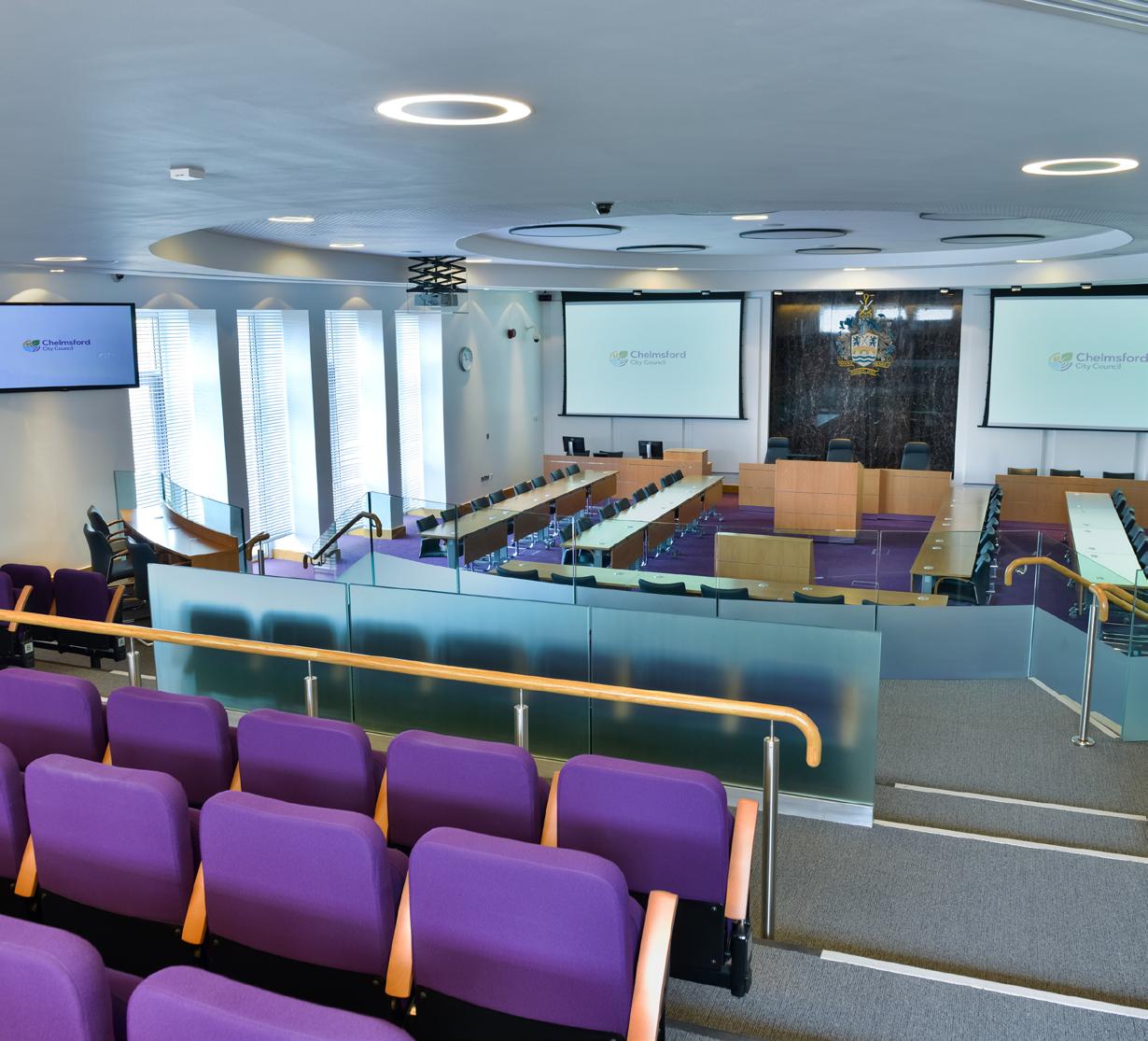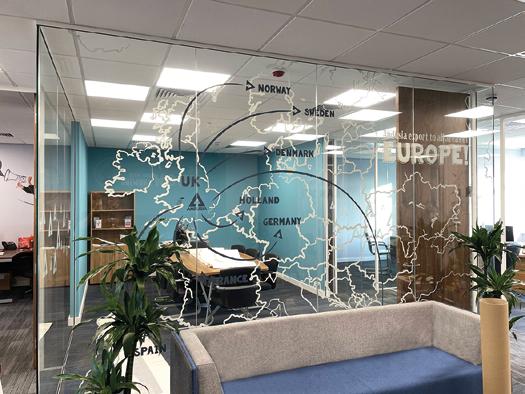






with wood and disney : The Advisors to Ambitious Entrepreneurs
Wood and Disney are a tech savvy firm of chartered accountants who bridge the gap between numbers and dreams by using our skills with numbers and multiplying this with our experience in business to make a real difference to our clients’ lives with jargon-free, pragmatic and best practice business advice.
The most successful people focus first on accumulating business assets before they can reap the benefits of that success personally. Those business assets may be intellectual property, tangible assets, the best team, the best systems or perhaps the most important thing for long term survival, CASH. Recessions occur regularly every decade or so, but the survival rate of small businesses is staggeringly poor with less than 28% still being in business after ten years.
So, when we talk about Building Awesome Futures our vision is:
To defy the norm of business failure statistics and help 100% of our clients not only survive more than 10 years but also create a genuine asset to pass on to another generation
Over the past four decades we have created a process called Your Journey to Freedom® with over 500 tried and tested resources and tools. This process is a best practice process for established businesses where the owner has either reached a plateau or has exploded with growth and is fearful of losing control.
Wood and Disney
Lodge Park, Lodge Lane, Langham, Colchester, CO4 5NE
01206 233170
www.woodanddisney.co.uk
www.yj2f.co.uk

AWARM (hopefully!) welcome to our spring issue – one which (hopefully!) reflects the seasonal theme of regeneration and new life.
It’s easy to get worn down by the tide of pessimism emanating from the national media, understandable though much of it is. However, here at BusinessTime in Essex, we prefer to maintain a mood of realistic optimism. If we’d have believed the doom-mongers, we wouldn’t have got past our first issue because, so many people told me, print was dead – but here we are publishing our 35th issue in our ninth year, and another bumper 80-pager at that.
So, the following pages are designed to keep you up-to-date with the latest news and views concerning the Essex business scene. I’m so fortunate to have such an amazing group of contributors who share their knowledge and thoughts with you via our pages. It makes my job pulling it all together relatively

Devolution, hybrid working, a new Essex business board, cyber security and a six-page ‘survive and prosper’ feature (starting on page 66) are just some of the subjects tackled in this issue so, sit back, grab yourself a cuppa and catch up with all that’s happening on the vibrant Essex business scene.
Talking of prospering, we have teamed up with Colchester-based Contigo Associates to offer BusinessTime in Essex readers a deal which is not to be missed – see page 18 for details.
I really hope you enjoy reading this issue. Don’t forget, it’s very easy to be part of our next issue which will hit desks on June 1 - have a quick look at page 36 to see how. In the meantime, enjoy spring!


BusinessTime in Essex Colchester-based PJR Communications. Publishing Editor
Peter Richardson 01206 843225 or 07778 067614
peter@pjrcomms.co.uk Sales
Vivienne Richardson 01206 843225
Designed and Produced by Print Acumen Ltd 0345 340 3915
Mailed out by
The DS Group 01255 221322

Publishing Editor
To advertise or feature in the next issue of BusinessTime in Essex, contact Peter or Vivienne as detailed above.
CHELMSFORD-BASED R&D tax consultancy RDA has extended its suite of services into intellectual property (IP).
Launched in January this year, RDA’s new IP-services arm will offer companies valuable support in developing patent and trademark applications, copyright and design rights, as well as trade secrets and confidential information.
And as one of the nation’s leading independent R&D-focused tax agents, RDA
will bring its deep expertise to delivering clients tax relief on their IP-related turnover through the government’s valuable Patent Box scheme.
RDA’s founder and managing director, Kevin Auchoybur, said: “Moving into this area is a natural progression for our company and for our clients. With every R&D tax-relief claim we support, we see a wealth of protectable IP.
“Expanding RDA’s offering into this area will help our clients identify, protect and leverage their IP, as well as helping direct their R&D strategies in future.”
Leading RDA’s new IP division will be Alec Griffiths, an IP specialist with more than a decade’s experience in supporting businesses through their design, copyright, trademark and patent journey.
He said: “RDA and IP are the perfect fit. And as our analysis piece in this edition shows, there is so much we can do to guide innovative businesses beyond the expert support in R&D tax relief that has made RDA’s name.
“I look forward to helping any Business Time in Essex readers who would like to learn more about developing and protecting their intangible assets.”

RDA’s proud association with motorsport is shifting gears to the very top of the range, with Tom Gamble winning a prestigious seat in the 007 Valkyrie AMR-LMH hypercar in the world’s elite sportscar series. Gamble, a former British Racing Drivers’ Club Young Driver of the Year, has benefited from RDA sponsorship since 2019. And now he has caught the eye of one of the biggest teams in sportscar racing.
The Heart of Racing is the Brackley-based American team whose association with Aston Martin dates back to 2020, running the Vantage AMR GT3 Evo in last year’s WEC series and the Vantage AMR the previous year.
This season the 007 Valkyrie hypercar will –uniquely – be running not only in the WEC but also the IMSA WeatherTec SportsCar Championship. That is not all that is unusual about the car.
Its monster 6.5-litre, V12 engine is a variant of the Aston Martin road vehicle of the same Valkyrie name and a flashback to the Audi R10 that became the first V12 engine to win the 24 Hours of Le Mans race in 2006.
Aston Martin are hoping the improved efficiency of the Cosworth engine can outlast the hybrids being run by most of the WEC field.
It is perhaps something of a gamble, although the same cannot be said of Heart of Racing team principal Ian James’s decision to turn to Gamble to help Aston Martin dominate the sportscar division.
“I rate him very highly as a natural talent and he deserves a chance in the spotlight at the highest level of sportscar racing,” said James. Gamble’s year with Heart of Racing began with enormous promise, collecting a podium finish at the IMSA season-opening 24 Hours of Daytona in January. It is form the team is expected to carry through the entire season, with high hopes it will land a first title for Aston Martin since 1959 in the centrepiece Le Mans race.
Team RDA will be there in force to cheer him on through every turn, because for RDA and Gamble, it has always been about how they develop together.








by Iain McNab, Head of Policy at Essex Chambers of Commerce
MANY readers will have heard the d-word (for devolution) bandied about for some time – and you will be hearing it a lot more following a Government announcement on February 5 that Essex is one of six places to be included in a priority programme to deliver a devolution deal.
In our case this would cover the entire county. The announcement has been warmly welcomed by the leaders of all three upper tier authorities: Essex, Southend and Thurrock.
Devolution is being linked, as set out in a recent Government White Paper, with a process of local government reform (LGR) which will run roughly in parallel. The result, if all goes to plan, will be a very different-looking governance model in Essex to what we have now: a mayoral strategic authority and a few unitary councils (perhaps four or five) replacing the existing county council, two unitary authorities and 12 district councils. Southend and Thurrock, although already unitary authorities, will not stay as they are but will be merged into larger entities.
This article aims to explain the likely changes and why we at the Chambers of Commerce believe it will be good for residents and business alike and should be supported.
Devolution is about devolving powers away from central government to local areas so control and decision-making over some issues is exercised locally. So far, a particular model - an elected mayor working with a strategic authority - has been rolled out mainly to metropolitan areas, most notably and for longest in London but more recently to Greater Manchester and other places. We have become used to quite powerful mayors having a national profile and being powerful voices for their areas. This could be the case for Essex in future.
What will be devolved to local areas under devolution deals?
The key areas in which powers would be devolved are:
• transport and local infrastructure
• skills and employment support
• housing and strategic planning
• economic development and regeneration
• environment and climate change
• health, wellbeing and public service reform
• public safety.
Devolution would likely bring with it a long-term investment fund allocated by the Government. Greater Essex will have more control over its own funding, creating greater flexibility to target resources where they are needed most - in trade, inward investment, skills development, infrastructure
or sector-specific growth. We’d expect to see efficiencies, economies of scale and so on.
The Mayoral Strategic Authority will have a mandate to develop a new Local Growth Plan, essentially an Essex version of the UK’s industrial strategy. From a business perspective we believe this, harnessed to a wider economic strategy, would help set a clear sense of direction for the Essex economy. Business influence would be exerted through the new Greater Essex Business Board, which has recently been established.
A Strategic Plan for Greater Essex would also need to be put in place, setting out strategic growth locations and providing a framework within which to plan for the pattern, scale and design of quality places for the next 30 years. This would include provision for new communities, affordable housing, employment space, necessary infrastructure and the conservation of green space and our historic environment.
Devolution could happen without LGR and vice versa, but they have been linked by the Government with a view to them being tackled concurrently. We believe this is sensible. Much of the rest of the country has already replaced the two-tier system with a single tier i.e. unitary authorities, which combine the powers of counties and districts. Essex, and a few other places, have not yet, but many people think that 15 local authorities is too many – and a simplified structure should be easier for business to engage with.
The next step is for Essex to submit outline proposals for reform by March 2025. Discussions are underway around the county on what the future might look like. It will mean existing local authorities joining together in a new configuration. In the north-east of Essex Colchester, Braintree and Tendring have already stated their ambition to join and form a new unitary authority. This could be a good fit as their combined population is around 500,000, which appears to be the Government’s preferred size for new unitaries. This would imply that Essex (population around two million) could have four similarly sized unitary authorities. However, it’s unlikely to be this straightforward – for example, some will think five smaller authorities would be the right number if projected housing growth is considered.
At the Chambers, we support the principle of the reform of local government but recognise it will be a very challenging project politically to carry through, especially given the timescales envisaged. We are neutral on the geography for now but look forward to the publication of proposals for consultation, at which point we will want to be sure they look right for business as well as residents.
This is a very brief overview but if you want to find out more or have comments, please feel free to contact Iain McNab at iainmcnab@ essexchambers.co.uk
















BUSINESS leaders have been selected to join an influential new board which will champion the economy of Greater Essex.
The Greater Essex Business Board brings together key businesses, influential and inspiring business leaders and will act as the voice of the private sector in Greater Essex.
Through an open recruitment process, 20 business leaders have been appointed to join the new board.
Membership reflects the economy of the area, different sizes of business, the geographical local economies and different perspectives of the business community. The board will help shape economic policy in Greater Essex.
The board will be chaired by Julia Gregory, who brings a wealth of knowledge and experience to the role. This has been built up during a 30 plus year career working across the private and public sectors, primarily in the real estate development sector.
As an active real estate and infrastructure leader in Essex and other nationally significant roles, Julia has supported delivery of key projects.
This includes delivery of a new garden city at Ebbsfleet and supporting growth aspirations during her time at Stansted and Gatwick airports.
As a Chairperson and Non-Executive Director, she currently leads the strategic direction of various companies. In 2023, Julia was recognised by the National Businesswomen Awards for a lifetime achievement award.
Julia said: “This group of business representatives is fantastic, we have real richness of experience and expertise and representation of a cross section of the economy in Greater Essex. Board members come from a variety of sectors - from ports, logistics and advanced manufacturing to construction and aviation - all have their role to play in supporting the economy.
“By coming together behind a common purpose; to encourage and support growth, we hope to make Essex stand out and compete for investment and grab the attention of policy makers to deliver new jobs and grow the economy in Greater Essex. Business is well placed to do this, together with our local authority partners.”
Working in partnership, Essex County Council, Southend-on-Sea City Council and Thurrock Council led an open recruitment process for the board. Appointments were made by a selection panel of Members from each authority.
The Greater Essex Business Board’s members are:
• Alan Shaoul, DP World
• Alison Hartley, Teledyne
• Andrea Cunningham, Metal Culture
• Ann Scott, Federation of Small Businesses
• Bolaji Sofoluwe, ETK Group
• Christopher Lines, Leonardo
• Denise Rossiter, Essex Chambers of Commerce
• Edwin Strang, Industrial Chemicals
• Eoin Lyons, SS&C Financial Services
• Jacqui Dallimore, Roslin Beach Hotel and Chair of Southend Tourism Partnership
• Lara Fox, Objective IT
• Mike Hardaker, MAG/Stansted Airport
• Ryan Liversage, Morgan Sindall
• Rupert Wood, Almcor
• Steve Beel, Freeport East
• Trevor Scott, Simarco
• Tim Price, Park City Consulting Ltd
• Professor Mohammad Ali, Anglia Ruskin University
• Dr Rob Singh, University of Essex By business, for business, with business, Members will play a key role in attracting

Julia Gregory
investment, influencing job growth, advising on infrastructure and skills priorities, and overseeing future Government programmes.
The board’s work will compliment that of organisations such as the Essex Chamber of Commerce, which will be a key collaborator in areas such as skills.
Councillor Louise McKinlay, Essex County Council Deputy Leader and Cabinet Member for Communities, Economic Growth and Prosperity, said: “The creation of the Greater Essex Business Board will support our region’s economy to reach its full potential. The board will help to set economic direction by advising, advocating and lobbying for the interests of businesses across the area.
“I am hugely impressed by the collective experience and knowledge amongst its members, and we look forward to working closely with the board going forward.”
Councillor Daniel Cowan, Leader of Southend-on-Sea City Council, said: “I am pleased to see the new members and chair appointed for the Greater Essex Business Board. I am looking forward to working with the new board to drive investment and growth at this important time for our area.”
Councillor Lee Watson, Cabinet Member for Good Growth at Thurrock Council, said: “The Greater Essex Business Board will play an important role in helping our region’s economy grow and prosper. I’m looking forward to working with the chair and the new board to ensure this growth delivers real benefits for Thurrock and for our residents.”
Members of the board are appointed on a yearly basis. The board will meet four times a year.
Find out more about the Greater Essex Business Board at: https://www.essex.gov.uk/ business/greater-essex-business-board.
UK businesses must brace themselves for looming employment law changes that will impact them this year.
While major reforms from the Employment Rights Bill are set to take effect in 2026, this year still brings significant legal shifts that require immediate attention and a need to prepare for the further reforms on the horizon.
The rise in the National Minimum Wage and National Living Wage, which comes into effect in April, is aimed at narrowing the pay gap across age groups, with the minimum wage for 18 to 20-yearolds rising by 16.3% to £10.00 per hour. The National Living Wage for those aged 21 and over will jump to £12.21 per hour. This means reviewing salary structures, ensuring payroll compliance and considering potential ripple effects such as pay compression (which may require adjustments to broader wage scales). Failure to comply could lead to significant financial penalties, reputational damage and, in more serious cases, potential criminal liability.
Beyond wages, 2025 also introduces new rights for working parents. The Neonatal Care (Leave and Pay) Act 2023, which takes effect in April, grants parents up to 12 weeks of additional leave and statutory pay if their newborn requires neonatal care. This will require businesses to update to parental leave policies and payroll systems.
Employers will also need to accommodate a new right under the Paternity Leave (Bereavement) Act 2024, which removes the existing 26-week service requirement for bereaved partners and could extend paternity leave to as much as 52 weeks.
These reforms underscore the growing legislative focus on familyfriendly workplace policies and the need for businesses to support employees during difficult personal circumstances.
While most of the Employment Rights Bill’s 28 proposed reforms will not be implemented until 2026, consultations on several key measures start this year. Among the most transformative proposals are the introduction of a ‘day one’ right to protection from unfair dismissal, in effect, eliminating the current two-year qualifying period.

The Bill also proposes tighter restrictions on the controversial ‘fire and rehire’ tactics used by some employers during restructuring, as well as the requirement for businesses to offer guaranteed hours to zero-hours and low-hours employees.
Strengthened protections against thirdparty harassment and enhanced rights to request flexible working are also in the pipeline.

While these changes are not immediate, businesses should begin reviewing their policies and workplace practices to ensure they remain ahead of compliance requirements.
Ola McGhee, Associate in the Company Commercial team at leading regional legal firm, Tees, urges business leaders to brace themselves for a wealth of changing legislation.
Several key employment tribunal cases in 2025 could further shape the legal landscape. One of the most closely watched is For Women Scotland Ltd v The Scottish Ministers, which could redefine the legal definition of a "woman" under the Equality Act 2010 and influence employer policies around gender identity and workplace equality. Another pivotal case, Augustine v Data Cars Ltd, examines whether a part-time worker must prove their employment status was the sole cause of less favourable treatment to succeed in a discrimination claim. Meanwhile, Higgs v Farmor’s School addresses the growing issue of balancing employees’ rights to express personal beliefs on social media against protections for other groups under anti-discrimination laws. The retail sector will also be closely watching Thandi and Others v Next Retail Ltd, a case dealing with equal pay claims between store-based and warehouse employees, which could set a precedent for similar disputes across the industry.
Beyond legal changes, 2025 is set to be a year of significant workplace evolution.
Diversity, Equity, and Inclusion (DE&I) remains high on the agenda, with a particular focus on better supporting neurodiverse employees.
Increasing use of Artificial Intelligence (AI) in recruitment, performance management, and decision-making presents both opportunities and risks. Many employment laws are yet to catch up with AI-driven workplace practices, making it crucial for businesses to develop ethical AI governance strategies.
Reviewing employment contracts, updating policies, and ensuring that payroll systems are aligned with new wage requirements are immediate priorities. Additionally, engaging with employment law experts can provide valuable insights into upcoming consultations and tribunal cases, helping businesses stay ahead of regulatory changes.
Training is another critical area of focus. Ensuring managers and HR teams understand the implications of the new laws will help foster a fair and legally compliant workplace culture. Good communication is also key, as clarity on rights and entitlements can help prevent misunderstandings and disputes and promote an engaged workforce.
Looking further ahead, businesses must prepare for the 2026 reforms outlined in the Employment Rights Bill. This means considering how a day-one right to protection from unfair dismissal will impact hiring and HR strategies, reviewing current redundancy and consultation procedures, and assessing how guaranteed hours contracts could affect workforce planning. The restrictions on fire and rehire practices may also require companies to rethink their approach to restructuring and employment contract changes.
By taking a proactive approach to 2025’s employment law changes, businesses can avoid potential legal pitfalls, maintain good employee relations and position themselves for long-term success. In an era of evolving workplace expectations and regulatory scrutiny, those who stay ahead of the curve will be best placed to thrive.
For further information, go to www.teeslaw.com/work-life/ employment-law
If you were a driver, a cyclist or motorcyclist or even a pedestrian in the 1920s and 1930s, you really were taking your life into your hands. At the time there were two million cars on the road – today there are 20 times that many.
According to the Department of Transport’s historical road-safety statistics, for every 409 cars there were on the road in 1926, there was a road-traffic fatality. This number hit a peacetime peak at a staggering one in 272 in 1934.
Compare that with today and it is chalk and cheese. Despite the proliferation of cars on the roads – amounting to 334 billion vehicle miles travelled – there were in fact fewer collisions overall in 2023 than in 1926.

As you can see from the chart above, road safety began to improve in the 1930s. (And, understandably, briefly worsened again in the early 1940s with the breakout of World War Two, when cars had to drive in darkness without headlights.)
The improvement was no coincidence. It was in 1930 that the UK government introduced the Road Traffic Act “to make provision for the protection of third parties against risks arising out of the use of motor vehicles”.
It was only a first step, but it worked – as the general trend towards road safety demonstrates. And the very same principle has applied in everything from air travel to restaurants to healthcare to construction sites: it is a safety-first story.
Regulation has clearly helped in activities where the public are potentially at risk. And in those sectors where risks are permitted to persist unchecked, damage can be done.
Regrettably, this has proven to be the case in one vital professional service in particular. The HM Revenue and Customs (HMRC) Research & Development (R&D) Tax Credits are a lifeline
for innovative companies developing new products and processes.
But they have been subject to cynical abuse by some participants in the tax-advice sector. According to HMRC’s most recent error-and-fraud estimates, as much as £1.3 billion of the total £7.6 billion awarded in 2021 to 2022 could have been to fraudulent or erroneous claims.
It is clear HMRC has its sights set on certain firms it believes to be responsible for this staggering drain on the exchequer’s resources. One East Anglia business was raided by HMRC enforcement officers last September. It has reportedly ceased trading, with another


nine related companies that traded from the same address having reportedly been wound up.
For Kevin Auchoybur, founder and managing director of the Chelmsford-

based R&D tax consultancy RDA, enough is enough.
“The corrupt practices of some rogue tax agents have placed their clients at tremendous risk,” said Mr Auchoybur. “Illegally claimed tax
relief requires repayment, along with penalties and interest.
“We at RDA have been appalled by the actions of some agents and we are determined to improve the standards in the industry,” he added. “It turns out that several other reputable firms are of a like mind, and we have got together to set up a standards body that will sort this out once and for all.”
The new body will introduce a code of conduct and formal governance processes that ensure all prospective members must undergo stringent vetting before being allowed to join. Mr Auchoybur reports that this adheres closely to the regulatory best practice operating in other sectors, ensuring members’ clients have proper recourse in the event of any alleged malpractice.
He adds that this will include a fit and proper persons test for all beneficial owners, officers and managers, restrictions on certain commercial practices and a formal complaints procedure for clients to seek redress.

“This inevitably has the effect of putting off genuine claimants from putting in for the relief – or perhaps even undertaking R&D in the first place. And that is not a good outlook for generating muchneeded growth in the UK economy.”
Understandably, Mr Auchoybur’s solution is based on the one that improved safety on Britain’s roads: regulation of his industry. But unlike for the Road Traffic Act, this is not something any statutory body is currently prepared to undertake. So, he has gone about it himself.
He also explained these matters will be rigorously enforced by an independent compliance expert and referred to an adjudicatory panel when required. “We are very confident that the benefits of joining a formal body that separates the wheat from the chaff will be very attractive to the respectable actors in our industry,” added Mr Auchoybur.
“It will also iron out any creases in their practices by ensuring they are both closely scrutinised and that they adopt the code of conduct into their own protocols. The threat of formal disciplinary sanctions including fines or membership being rescinded will, we believe, ensure ongoing compliance.
“We’re very excited about what this means for the future of our industry and R&D tax reliefs in general.”
According to research conducted in 2020 by Ocean Tomo, an intellectual property (IP) focused merchant bank in the US, there has been a dramatic shift in how the world’s biggest companies are valued.
In 1975, it discovered, intangible assets made up only 17% of their market value. Forty-five years later, it was tangible assets that constituted only 10%, with intangibles accounting for the other 90%. (See chart below.)
Long gone are the days where a business’ value was predominantly derived from its tangible assets – intangible assets have already taken their crown as the biggest value driver in business. Leading the charge in this economic shift is IP.
IP covers a broad spectrum of intangible assets, from brand identity through to technological advancements. Contrary to what some may say, ALL businesses have IP. They just do not recognise it. If you do not recognise it, you cannot protect it, and if you cannot protect it, it will not add value.
Most businesses do not recognise or protect the IP they generate, leaving them vulnerable to IP theft and financial loss – they effectively ‘donate’ their IP to their competitors.
• Increased Competitive Advantage – Exclusive rights to innovations, brands, and creative works prevent competitors from copying or profiting from a business’s unique assets.
• Revenue Generation – IP can be monetised through licensing, franchising, or direct sales, providing additional income streams.

Although slightly lower in the UK, at around 70% rather than the 90% in the US, intangibles are still the predominant driver of a business’s value. Transitioning away from traditional, physical assets in the knowledge-based economy means understanding and leveraging your IP becomes less a luxury and more a necessity.
IP is the crucial asset that distinguishes a business from its competitors. Recognising and protecting your IP brings several benefits, such as:
Tax Reduction – UK companies that own UK or European patents could be eligible for a tax reduction on profits relating to their patents through accessing the UK Patent Box scheme.
Risk Mitigation
– Securing IP rights protects businesses from infringement lawsuits and unauthorised use by others.
• Increased Business Valuation – Investors and potential buyers view strong IP portfolios as indicators of long-term growth and stability.

• Failing to recognise and protect IP can result in lost opportunities, legal battles, and reputational damage. Companies that actively manage their IP assets ensure they maintain control over their innovation, growth and future.
IP rights such as patents, designs, trademarks, copyrights and trade secrets are valuable tools in safeguarding the intangible assets within your business. These assets are often more valuable than physical assets, such as inventory, real estate and the like, however, they are considerably more difficult to identify.

How you manage your IP, and therefore the bulk of your intangible assets, is referred to as an IP strategy. The term might seem daunting, or like legalese designed to confuse, but an IP strategy is just a component of your business strategy.
The strength of your IP strategy often correlates to the value of your intangible assets, and as we’ve pointed out, the value of your business - no business ever decreased in value by developing a robust IP strategy!
Developing a strong one involves several key steps. First comes an IP Audit & Identification – Businesses must assess their existing assets, including inventions, branding elements, and proprietary knowledge, to determine what qualifies for IP protection.

Is your business fit for the Age of IP?
RDA’s senior IP and patent expert, Alec Griffiths, can help you find out. Alec is a commercially and strategically focused IP manager with a strong track record in aligning IP with business strategy.
His domestic and international clients receive advice on protection, commercial exploitation, and risk mitigation through the innovation life cycle, from ideation to market launch. He provides essential support in innovation-based tax-relief regimes, infringement risks, portfolio management and alignment strategies.
He helps clients deliver a structured methodology and company-wide strategic initiatives, informed by business objectives and market realities to overcome all the technological, financial and strategic hurdles in exploiting IP. If you would like to learn more from Alec, give him a call on the number below.
infringement will safeguard your business interests.

Then it is about securing IP rights by filing patents, registering trademarks, and protecting copyrights and trade secrets to ensure exclusive ownership and legal protection. Next is monitoring & enforcement; regularly tracking IP usage and enforcing your rights against
Another important step to understand the landscape. Knowledge of competitor IP provides valuable insight into competitor and market direction. It also offers opportunities to avoid confrontation and maximise the efficiency of resource use within your own business by not reinventing the wheel.
Finally comes strategic monetisation. Through licensing, your business can maximise the value of its IP assets, not least with tax relief from the HMRC Patent Box scheme. In short, by implementing a proactive IP strategy, companies can strengthen their market position, attract investment, and unlock new revenue opportunities.


What’s the most crucial asset in your business?
It’s not just your technology, your products,
It’s your people. Without engaged and
What’s the impact on your bottom line?
It’s real, measurable and damaging for your but it doesn’t have to be this way.




EMPLOYEES are often the best people to identify problems and come up with new ideas. They interact daily with products, services, and customers, so they know what works and what doesn’t.
By involving employees in developing business strategies, companies can benefit from fresh insights that improve the company’s direction. Set up regular brainstorming sessions with employees from different levels and departments to share ideas on improving products, services, or processes, and create an opendoor policy where employees feel comfortable sharing their thoughts, whether it’s through meetings or suggestion boxes.
By involving employees in these ways, businesses encourage innovation and ensure strategies are based on real, on-the-ground feedback. When employees feel their input matters, they are more likely to be engaged and motivated.
As businesses evolve, employees need to grow with them. Companies that help their employees develop new skills will have a workforce ready to meet future challenges. Involving employees in business development not only helps the company but also boosts personal growth.
Offer training and development progammes that align with the business’s goals and strategy, and encourage employees to participate in cross-departmental projects where they can develop new skills and learn more about the business.
Providing employees with the tools and opportunities to grow will make them feel valued
and supported. This also helps businesses retain top talent and reduces turnover costs.
Business development isn’t a solo effort; it’s a team effort. When employees work together on strategy, they bring different perspectives and skills to the table. This helps create better solutions and strengthens relationships across departments.
Create cross-functional teams to work on specific projects or challenges, allowing employees to collaborate with colleagues they don’t usually work with. Hold regular team-building exercises that promote communication, trust, and collaboration between departments.
By fostering teamwork, businesses not only improve their strategies but also build a stronger company culture where employees feel more connected to each other and the organisation’s goals.
Today’s employees, especially younger generations, want to feel their work has meaning. By involving employees in strategy development, companies show they value their contributions, which can lead to higher job satisfaction and loyalty.
Regularly update employees on the company’s goals, progress, and how their work contributes to those goals. Offer opportunities for employees to take ownership of projects or initiatives, giving them a sense of responsibility and accomplishment. When employees see their impact on the company’s success, they are more likely to stay committed and stay with the company long-term.
Involving employees in business development helps to create a culture where communication flows freely between management and staff. When employees feel they can

speak up, they are more likely to share useful ideas and feedback, leading to better decision-making.
Hold regular ‘town hall’ meetings where leadership updates employees on company goals, performance, and upcoming changes. Allow employees to ask questions and provide feedback. Use surveys or suggestion tools to gather input from employees on key decisions or strategies. A transparent communication culture helps align employees with the company’s mission and ensures that everyone is working towards the same goals.
In today’s fast-moving business world, companies need to stay ahead to succeed. One key way to achieve this is by involving employees in both their own development and the creation of business strategies. When businesses include employees in these processes, it leads to better strategies, a more engaged workforce, and longterm success. Tony Kerley, director at Colchester-based Contigo Associates Ltd, explores why involving employees is important and suggests practical steps for organisations to follow.
To immediately begin involving employees in business development, businesses can take the following steps:
• host a strategy workshop: organise a session where employees from various departments can brainstorm ideas and suggest improvements to the business strategy
• create a feedback loop: set up a system where employees can easily provide feedback on current strategies and suggest changes. This could be through regular surveys or suggestion platforms
• provide learning opportunities: offer training or workshops focused on skills employees will need to contribute to business development. Include leadership skills, strategic thinking, or industry-specific knowledge
• recognise contributions: make sure to recognise and reward employees for their contributions to business strategy development, whether through formal recognition or incentives
• promote cross-department collaboration: actively encourage employees to collaborate with colleagues from other departments on business development projects. This promotes new ideas and a shared understanding of the company’s goals.
Involving employees in business development is a winwin for both the organisation and its workforce. It leads to better business strategies, fosters innovation, and helps retain talented staff. By creating opportunities for employees to contribute to strategy development, businesses create a culture of collaboration, learning, and engagement that drives longterm success.
Implementing these simple but effective steps – such as setting up brainstorming sessions, offering learning opportunities, and promoting open communication – can make a significant difference in how businesses develop and execute their strategies. These actions not only help develop more relevant and effective strategies but also contribute to a more motivated and committed workforce.
BusinessTime in Essex has linked up with Contigo Associates Ltd to offer this fantastic opportunity to supercharge your business towards unparalleled success.
Join us for an exclusive free morning business breakfast with Tony Kerley FCIPD, FInstLM, FIoL, Managing Director of Contigo Associates. This dynamic session will equip you with the essential strategies to fuel growth and achieve lasting success.
The event takes place at the Colchester Innovation Centre at the University of Essex on Friday May 2, starting at 8.00am and finishing at 10am.
This inspiring interactive session is designed for small business owners and entrepreneurs ready to elevate their game. Walk away with actionable insights centred on four transformational pillars for success.
Let’s accelerate your business journey, together.
1. Purpose-driven vision
Create a compelling, clear vision that answers your “why?” and drives every decision. Position your business to stand out, resonate deeply with customers, and inspire employees.
2. Market mastery
Pinpoint your ideal customers, define your unique edge and master the art of efficient marketing and sales. Automate where possible to free up time and scale faster.
3. Unstoppable teams
Build, lead and nurture a high-performing team. Harness frameworks like Tuckman’s Model and principles from Lencioni, John Adair and Ken Blanchard to foster a culture of trust, collaboration and productivity.
4. Sustainable growth strategies
Align operations, finances, and strategy to scale seamlessly. Navigate risks, anticipate trends and implement processes that ensure sustainable growth for years to come.
Agenda at a glance:
8:00 am – welcome breakfast and networking
8:15 am – keynote by Tony Kerley: Driving for Growth
9:00 am – interactive discussion & Q&A
9:30 am – exclusive offers and wrap-up
Exclusive benefits for attendees: Receive special discounts on Contigo Associates’ renowned consultancy and leadership services, including:
• 1-2-1 executive coaching
• bespoke leadership and management
• business strategy development
• tailored team-building solutions.
Power-up your business with expert guidance and tools designed to help you thrive. Don’t miss out! Secure your spot now, as there are only 20 free spaces available.


THE thought of dragging yourself out of bed on a damp, cold January Monday morning is hard enough under normal circumstances – so imagine how much more unpleasant it became upon reading the morning headlines on the BBC news website and discovering I hadn’t actually done any proper work for the past 35 years.
Yes, according to Lord Rose, former boss of Marks and Spencer and Asda, working from home is creating a generation who are ‘not doing proper work’.
So, building one of the area’s most respected media relations consultancies and then creating from scratch the UK’s leading regional B2B magazine, all whilst working very happily from home, clearly couldn’t have really happened – just a Bobby Ewing dream sequence obviously (one for the oldies there).
Clearly the whole working from home debate shows no sign of abating. With large companies including Amazon, Boots and JP Morgan now requiring their head office staff to be in every day, Lord Rose added further fuel to the debate by telling BBC Panorama that home working was part of the UK economy's ‘general decline’ and employees' productivity was suffering.
Now everyone has at least one hobby horse, and hybrid working is mine. In fact, I tell a lie – I actually have two hobby horses but, in hindsight, I now believe they are intertwined. The other is the sad demise of LinkedIn during the past year or two, to the point it is now dominated - from where I view it anyway - by a small but alarmingly active (as in at least one post a day) band of people bearing their souls and seeking sympathy on issues I wouldn’t really want to read on Facebook, let alone LinkedIn. And those that aren’t indulging in such matters are instead conducing puerile surveys in the hope, no doubt, it will boost
their LinkedIn profile. There’s one woman who must comment on every other post on LinkedIn. How she finds the time to run her own business is beyond me.
My theory is (and I stress without any authoritative research of any kind, just gut feel) that most of the people living their lives on LinkedIn are people who perhaps used to work in an office and now work mostly from home – and who sadly struggle coming to terms with the more isolated working environment. Anyway, I digress – back to the home working debate or, perhaps we should more accurately say, hybrid working debate, for hybrid working is surely the hub of this whole debate.
There is a percentage of people who, either by the nature of their job or personal circumstances, need to work in ‘the office’. There is a percentage who can work highly effectively and happily without stepping foot in ‘the office’ ever again. Both these groups should be left to go their own way. It’s the fairly large percentage in the middle the debate should focus on.
The easy, dare I say lazy, answer is to dictate everyone must work in the office full-time. But this is an awful waste of an opportunity Covid afforded us to review working practices in line with 21st century conditions. The advantages of working from home two or three days a week are manifold: less congestion on roads, less pollution of the atmosphere, better worklife balance, happier staff leading to better staff retention and, many argue, greater staff productivity. This latter issue really seems to divide opinion. Resolve this and the picture probably becomes clearer as, at the end of the day, most bosses are more interested in productivity than the other aforementioned benefits.
In the winter issue of BusinessTime in Essex, we ran a fantastic article by Jessica Douglas, Head of People and Corporate Services at Colchester City Council, who argued articulately and forcefully for flexible working being a win-win for employee and employer.

She stated that employee productivity at the council had actually risen with the introduction of flexible working. If you haven’t yet read it, please do, as it’s a great example of how hybrid working can and should work.
With the current Government keen to pursue more flexible working options, as evidenced by its Employment Rights Bill introduced in the autumn, it is clearly going to be an interesting year or two ahead. It would appear that sooner rather than later, businesses will have a lot of the choice taken away from them and will be forced to recognise the right of their employees, where appropriate, to work part of the time away from the office. The challenge will be for HR leaders to recognise this inescapable fact and set the wheels in motion for a smooth transition, being mindful both of legislation and common sense.
In the next couple of pages, we take a look at what could lie ahead…

TWO prominent business leaders, Lord Alan Sugar and Asda boss Lord Rose, spoke recently about hybrid working, expressing opinions strongly in favour of a back-to-theoffice approach for most workers and, in Asda’s case, changing company policy to enforce a three-day week minimum office time.
This had a mixed response in the media, with very strong views on both sides of the argument. But, what is better for our health?
Firstly, we need to look at the concept of health, as it often means different things to different people. ‘Health is the absence of disease or infirmity’ was the western definition of health until 1948. This defined health in a negative sense - by the absence of, rather than a positive state.
In 1948, the World Health Organisation established a more positive definition: ‘health is a state of complete physical, mental and social well-being and not merely the
absence of disease or infirmity.’ In this way, both internal and external factors are considered, health is defined as a resource for living.
From a workforce perspective, few would argue that a cohesive workforce requires at least some face-to-face time. In an article for Entrepreneur, David Nilssen argues that hybrid work can create a divided workforce, leading to challenges with inclusivity, productivity, scheduling, and company culture. Writing for Harvard Business Review, Mark Mortensen highlights that hybrid work environments can sometimes become toxic. He points out that the varied contexts in which employees work can lead to disrespect, noninclusivity and other negative behaviours.
On the plus side, and from the perspective of individual health, articles from Psychology Today and The Stanford Report suggest there are many benefits to hybrid work, the key highlights are shown below.
Krekel et al, writing in the Global Happiness and Wellbeing Policy report 2019, showed the health and wellbeing of employees is linked to increased productivity.
Hybrid working offers several health benefits, supported by various studies and reports.
Improved physical health: hybrid workers tend to exercise more, sleep longer and eat better. A study by IWG found hybrid workers exercise for almost 90 minutes more a week, get an extra 71 hours of sleep a year, and have healthier eating habits.

Alix Sheppard, Director at Colchester-based public health consultancy, Health Talks, examines the health benefits of hybrid working.
Better mental health: the same study revealed 66% of hybrid workers reported improved mental well-being due to additional personal time. This extra time allows for better work-life balance, reducing stress and burnout.
Enhanced employee well-being: hybrid work arrangements can lead to a more engaged and productive workforce. Employees have more control over their schedules, which can lead to higher job satisfaction and lower turnover rates.
Reduced commute stress: by reducing the number of days employees need to commute,
hybrid working can decrease the stress and time associated with daily travel. This can lead to a more relaxed and focused work environment.
Healthier lifestyle choices: with more time at home, employees can prepare healthier meals and have more opportunities for physical activities like walking or running.
As employers, we should individually consider the needs of the business and carefully balance these with the needs of our workforce. Hybrid working, when managed effectively, can facilitate a flexible, productive, and satisfied workforce.
FLEXIBLE working is not only about where you work of course – it’s also about when you work.
Marketing agency, VerriBerri, was one of the first Essex businesses to implement the four-day working week structure and is encouraging more companies to follow suit.
As a forward-thinking agency, the company has always thought outside the box when it comes to employee wellbeing. Initially skeptical about remote working due to the highly collaborative nature of the business, the firm instead explored alternative ways to enhance flexibility while maintaining productivity. The concept of a four-day workweek was first proposed by senior management in 2018 but was initially trialed for three months before making a long-term commitment.
Under the new way of working, employees transitioned to an 8am-6pm schedule across four days, ensuring salaries remained unchanged. The transition during the trial period was seamless and the benefits were almost immediate. Employees embraced the change, reporting
higher job satisfaction, increased motivation and improved work-life balance. The four-day week was therefore extended into a full-time routine for members of the team who wanted to opt into it. There are some team members who prefer a more traditional 9-5 still, which the business also accommodates.
Employee days off are staggered so at least one team member from each department is always available. This approach eliminated service disruptions and, in fact, clients responded positively to the new system. Many appreciate working with a company that values employee welfare, are interested in how it works and have even considered implementing it themselves as a result.
Staggering days off and having longer days not only ensures VerriBerri’s office is open five days a week, but has extended the businesses opening to 8am-6pm, which has also been a positive for clients.
Assistant Director, Amy Spooner, said: “We immediately noticed that staff were happier, more motivated and more energised after a
three-day weekend. In our line of work, creativity is so important and this allows the team time to explore other creative avenues. Some of our staff have been able to start new business ventures, establish side hustles and pursue passion projects with their day off, transferring their skills to their work here at VerriBerri.”
Beyond enhanced creativity, staff retention has also increased which management puts down to an increase in employee satisfaction and welfare, but also because staff feel valued and appreciate the flexibility, so want to stay loyal to the business.
There are key policies in place to ensure fairness and consistency; for example, employees can’t swap their designated day off and if additional time off is needed, they must request annual leave. This structure ensures operational stability while maintaining the integrity of the four-day workweek model.
VerriBerri has recently been accredited by Four Day Week Foundation. Having seen the benefits first hand, they are an example of how successful the four-day week can be for both employee welfare and business performance.
PRIOR to the pandemic, for most organisations, the idea that someone worked exclusively remotely or even partly remotely was relatively rare in many sectors but certainly not unheard of.
The technology existed (and has had significant investment and improvement since), but for various reasons, there was resistance - even if the role could be carried out effectively remotely.
When the pandemic hit, organisations that had resisted remote working put in place remote working arrangements and mandated remote working - there was no choice! For most organisations and individuals, the choice was binary: remote work or no work. Many adapted - and adapted well.
According to (or derived from) statistics collated by the Office of National Statistics, in the period October to December 2019, homeworking in the UK was at 4.7 million. By January to March 2022, that had risen to 9.9 million people. In terms of percentages, in May 2020, 33% of the working population worked from home only. This dropped significantly to 16% by December 2024, whilst hybrid working rose from 8% to 25% in the same period, and those attending the workplace rose from 29% to 41%.
Some of this will be workforce demand with individuals benefitting from working remotely, for example, to suit their personal preferences and circumstances and to achieve a better work-life balance. Others believe, and I agree, some are more effective
when working remotely without the interruptions a workplace environment sometimes brings. Others may have been driven by organisational inertia, with companies hesitant to force employees back into the office for fear of uproar. How many organisation leaders have truly reflected on their business postpandemic with a laser focus to understand what worked, what didn’t and what could be improved?
Businesses absolutely should review operating practices regularly. Things change, often rapidly, and what worked yesterday may not be suitable for today, let alone the future. An organisation’s location of work strategy requires regular review - should it mandate a workplace-only, remote-only, or hybrid approach?
The starting point for every organisation is the roles that make it up. Focus on the role, not the individual carrying it out, and consider each one separately. What are the duties of each role? Where can those duties practically be carried out? Where are they most effectively performed? Be realistic, and don’t fall into the trap of assuming that the way things have always been done is the best way. Generally speaking, organisations that remain static don’t succeedeven leading brands, such as Coke, change their design and recipe!
If some duties require workplace presence and others can be (effectively or otherwise) carried out remotely, can some or all of the duties be organised or planned to be done at certain times on certain days so that a hybrid strategy could be effective?
If you sketch it out, you might draw two circles: one for duties

Julie Temple, Partner, Head of BLHR and Employment Team at Birkett Long, offers advice to businesses looking to formulate a hybrid working strategy.
that require workplace presence and the other for duties that can be (effectively or otherwise) performed remotely. In some cases, there will be an overlap between the two circles. The size of each circle and the overlap will vary depending on the role. Since this approach focuses on individual roles rather than a global approach across the entire organisation, the results will differ from role to role - and that’s expected. There might just be one circle!
Of course, dealing with roles within an organisation in complete isolation is shortsighted and likely unsustainable. Roles interact with other roles, and this must be factored into the location of work strategy. This means identifying interactions across roles, teams, departments and, in some cases, locations. Organisations then need to ask -,again, for each interaction - how and where it can be carried out and how effective each approach is. Can these interactions be planned and organised to support an effective hybrid approach?
A role-focused system centred on the roles within the organisation is essential for developing a location of work strategy. However, this must be balanced with the needs of the individuals who perform these roles. This is where legal risks arise.
Changes in work location could lead to breach of contract claims, discrimination claims based on location, lack of flexibility, or issues arising from flexible working requests. Minimising these risks requires a balance between what the organisation needs from a role (already identified) and what can practically be achieved, compared to what is effective and acceptable to the organisation - a balance that should withstand scrutiny.
There is no one-size-fits-all answer, and neither should there be. Each role is different, each person is different and organisations should strive for equity (considering roles and circumstances individually) rather than equality (treating every role and individual the same regardless of circumstances). If you are in doubt, seek specialist legal advice.

More than ever before image is everything. That’s why when it comes to your business it really does pay to invest in excellent photography.
In the digital era, content is king! Websites and social channels all demand images that stand out, will intrigue people to know more about your business, people
and products. This is something you simply cannot get with a stock image. It’s also a skill. If you wonder why your competitors are getting more engagement and followers, look at their content. Are they producing more dynamic images and film? Are they better storytellers? Often, the winners aren’t those with an award-winning new product, just an ability to excite audiences through the power of pictures.

Cameras on mobile phones can be a real asset, but without an experienced pair of hands behind the lens, they can also be a company’s downfall. Often, you’ll find the file size is too small, the lighting and camera angle poor. When you have a great image, you want it to really work for you. It needs to engage not only online but also provide a great visual for large-scale exhibition stands, direct mailers, brochures and annual reports.
Every picture tells a story

Carl Allen, Director at Colchester-based Big Wave PR, stresses the importance of not cutting corners when it comes to getting your image spot-on.
Our in-house photographer understands the editorial needs of a press image and our photos have gained column inches in The Times, The Guardian, amongst many other trade and local titles.
At Big Wave PR, much of our work involves getting our clients on TV or in the press. In the media, pictures sell stories. A great photo can be the difference between a ‘news in brief’ to a page spread; the return on investment is so worthwhile.
To hire Big Wave PR for photography, PR, social media or event management , email: hello@wearebigwavepr.co.uk, or call Carl on: 01206 231807 –www.wearebigwavepr.co.uk.



Tell us more about your role at Scrutton Bland.
As an Audit Partner, I head up the corporate team at our Colchester office. We’re a team of around 15, all with lots of different experiences, from school leavers to established senior managers. Together we work with businesses across a wide range of sectors, from owner-managed SMEs to national and international companies based in Essex.
What’s your career history so far?
I’ve worked in audit and accounting for my entire career, having started as a graduate trainee more than 30 years ago. I’ve worked my way up to Audit Partner and then on to Managing Partner of BDO’s Cambridge office, having been part of the team that had successfully set up the Cambridge office from scratch.
Finance wasn’t necessarily the career route I planned to take, as I studied languages at university. But I’ve carried this through my career as a reminder of how those from non-finance backgrounds can bring different perspectives
to the industry, with a wide range of problem-solving skills and the ability to think ‘outside the box’.
What are your career highlights?
There have been plenty, but some of those that stand out are an audit client who went public in the US – a huge piece of work that I was very proud to be involved with. Similarly, a UK life sciences company I worked with was a really interesting and fun project. And the biggest challenges?
Rapidly expanding our team from 16 to 45 people in just three years was a challenge, but one I thoroughly enjoyed. We built up an international team made up of more than 12 different nationalities. Despite the occasionally leftfield problems that come with managing a large team, we consistently came out top in staff satisfaction surveys.
What would you tell someone at the beginning of their career that you wish you’d known?
Looking back now, I’d say to always have a clear understanding of what you contribute to both


your role and to the business. I think we’re all guilty of not reflecting on our achievements and accomplishments enough. Getting and giving recognition, and rewarding positive contributions is incredibly important. What do you enjoy most about your role?
Piers Harrison joined Scrutton Bland as a Corporate Partner in the Audit team in September 2024 and is based in the Colchester office. With years of experience in the industry, he took some time out this month to share more about his role at the firm, his career highlights, and the opportunities he’s most looking forward to as he works with businesses across Essex.
100% the people. Both the team I work with - I love being amongst a group of engaged and motivated individuals and helping them to develop and progressand the clients I build relationships with. Seeing businesses thrive and succeed, and learning from individuals across a diverse range of industries and businesses is both fascinating and motivating. What do you enjoy most outside of work?
Well, having spent the past 20 years bringing up a family, and all that goes with it, I suddenly have a lot more time on my hands as both kids are now at university. So, perhaps the golf course is calling me once again? Although having not played regularly for quite some time, I may need to get some practice rounds in!
Any sector specialisms?
The joy of audit is it covers each and every industry, but I particularly enjoy working with manufacturing and distribution companies, tech and life sciences, US businesses, and private equity backed businesses.
Having not long joined the business, I’m still very much enjoying the opportunity to get to know our clients and their various industries in depth. I’m
always keen to hear from Essex businesses who’ve recently taken external investment, or from those looking to expand nationally or internationally, to offer audit advice and support. So, please do get in touch or connect on LinkedIn, I’d love to hear from you.
Tell us a bit more about audit services at Scrutton Bland
A thorough external audit helps you to make informed decisions about your business. Whether legally required or not, it allows specialists to take a detailed look at your business to verify your financial statements, keep you compliant and reveal ways to improve your systems and controls.
At Scrutton Bland, our audit services are designed to give you clarity, confidence and compliance, offering certainty of your current financial situation and showcasing where opportunities lie to improve your systems and processes. Along with a better understanding of how to satisfy stakeholders and potential investors, an audit puts you in a strong position if you need to access credit – as well as the knowledge you’re working in accordance with HMRC’s regulations and avoiding possible fines and penalties.
To find out more about audit services across Essex, speak to the team on 01206 838400, or visit www.scruttonbland.co.uk





INNOVATIONS that seemed futuristic just a few years ago are now integral to daily operations. For businesses, this rapid change presents both unprecedented opportunities and formidable challenges.
Staying competitive isn't just about keeping up; it's about anticipating and leveraging technology to drive growth, efficiency and innovation. For small and medium-sized businesses across Essex, there's an imperative to invest sensibly to avoid being marginalised by larger competitors.
This article delves into the key business challenges posed by technological evolution and underscores the importance of robust technology infrastructures across critical areas.
Digital transformation is no longer a choice but a necessity. Companies that fail to adapt, risk obsolescence as competitors leverage technology to enhance efficiency and innovation. A recent report from McKinsey highlights both analytical and generative AI can significantly improve innovation outcomes, including increased market fit and reduced time to market.
Organisations should begin by conducting a thorough assessment of their current digital capabilities. This involves evaluating existing technologies, employee skill levels and the overall digital culture. Identifying gaps in these areas is
crucial for developing targeted strategies to build necessary competencies.
Investing in employee training is paramount. A study published in arXiv emphasises the importance of organisational learning and knowledge development in advancing digital transformation, particularly for small and medium-sized enterprises. By fostering a culture of continuous learning, businesses can equip their workforce with the skills needed to utilise new technologies effectively.
Executive leadership plays a critical role in championing digital initiatives. Leaders must articulate a clear vision for digital transformation and allocate resources to support this transition. Business leaders need to adopt dynamic engagement models to drive successful digital transformations.
AI and automation are at the forefront of the digital revolution. Businesses can leverage AI to streamline operations, enhance customer experiences and drive innovation. For instance, AI can assist in product development by accelerating design processes and optimising testing phases, leading to faster time-to-market and improved product performance.
As technology advances, employees may experience a fear of becoming obsolete (FOBO). To mitigate this, companies should implement structured upskilling initiatives and promote a culture that embraces technological change. Encouraging collaboration between senior employees and techsavvy colleagues through reverse mentoring can also


Chris Hodson, Programme Director at Pitman Training in Essex, explores the key business challenges posed by technological evolution.
facilitate adaptation to new technologies.
The challenges presented by technological evolution are significant, but they are surmountable with the right knowledge and approach. Robust technology isn't just a support function—it's a strategic asset that can propel your business forward.
By focusing on critical areas such as cloud computing, AI, collaboration tools, data analytics, and cybersecurity, and by developing strategic planning and change management skills, you can navigate the digital landscape effectively.
Many businesses are finding benefit in appointing a digital systems champion who acts as a catalyst for transformation. It's an investment in your leadership capabilities and your organisation's future success.

Discover the unparalleled charm of Hylands House and the contemporary elegance of the Grand Pavilion, set amidst breathtaking parkland. If you’re in search of a truly remarkable venue for your business events, look no further.
• Company Away Days
• Go Ape Team Building
• Exhibitions & Trade Fairs
• Filming & Photography
• Hybrid Meetings
• Awards Ceremonies & Dinners


ROM April 6 2025, the thresholds determining whether a company requires a statutory audit in the UK are set to increase.
This change is aimed at reducing regulatory burdens on small and medium-sized businesses. While this will exempt more companies from mandatory audits, it is essential for business owners and finance leads to understand the implications and plan accordingly.
The Government has decided to increase the audit thresholds as part of broader efforts to support business growth and ease financial and administrative obligations. By raising the thresholds, the Government aims to reduce costs for SMEs, allowing them to focus on expansion and investment.
Currently, companies must undergo a statutory audit if they meet two of the following three criteria: annual turnover of more than £10.2 million, gross assets exceeding £5.1 million and more than 50 employees.
From April 6, these thresholds will increase to annual turnover of £15 million, gross assets exceeding £7.5 million and more than 50 employees.
Companies exceeding two of these new criteria will still require an audit, but many
that previously needed one will no longer be obligated.
The new thresholds will impact businesses currently just above the existing audit criteria. Those that now fall below the new limits may no longer need an audit. However, some businesses, including regulated entities such as those authorised by the Financial Conduct Authority (FCA), will not be affected by the changes and must still comply with existing audit requirements. This includes insurance brokers, which may require a client money audit rather than a full statutory audit.
Additionally, charities have separate audit thresholds, and these changes do not apply to them. Trustees and finance teams in charities should ensure they continue to meet their specific audit requirements.
For businesses close to the current thresholds, it is possible an audit may be required for just one year before falling below the new limits. This is because the changes apply to accounting periods starting on or after April 6 2025. If a company is growing and expects to exceed the current limits before the new ones take effect, they may need to consider whether changing their financial yearend could help them manage this transition.
Furthermore, businesses below the new thresholds should still assess whether an audit is beneficial. Many lenders, investors, and stakeholders require audited financial statements,

Michael Greene, Partner Streets Whittles Chartered Accountants which has offices in Colchester and West Mersea, explains the upcoming changes to audit thresholds.
even when not legally mandated. External assurance can enhance credibility, strengthen governance, and improve financial oversight.
If a company is no longer required to have a statutory audit, other financial assurance options can provide value, such as assurance reviews (a lighter-touch review) agreed-upon procedures (specific financial checks tailored to stakeholder requirements) and internal audits.
With the threshold increase approaching, business owners and finance leaders should review their audit obligations now. Engaging with an auditor early will help assess whether an audit is still needed, what alternative services may be beneficial and how to manage the transition.

THE route looks a little different now we have a Labour government in charge. Its first budget, last October, brings big changes, including employer National Insurance rates rising to 15%, boosts to capital gains tax rates, a 4% bump to the state pension and VAT added to private school fees.
Sluggish growth is likely to continue throughout 2025, with global GDP predicted to grow less than 3%. Landlords face a 2% hike in stamp duty for second homes, while first-time buyer relief remains unchanged. On the bright side, house sales are up 29% from last year (according to Rightmove), and mortgage rates should ease in 2025.
Supply chain issues in 2025 will see many businesses shifting gear to local suppliers due to climate and political challenges. AI and tech are helping automate and optimise processes, and growing consumer and regulatory demands will push companies to adopt more sustainable supply chain practices.
With disruptions ongoing, businesses would be wise to reassess their insurance policies to ensure sufficient cover, as they steer towards the new landscape of localised sourcing and sustainable operations.
In the autumn Budget, the UK raised its windfall tax on oil and gas profits to fund clean energy initiatives such as carbon capture, nuclear and green hydrogen. Gas and electricity prices are set to rise through the early part of this year, but long-term investments aim to stabilise costs, whilst increasing climate events raise risks and widen the protection gap when it comes to insurance.
As a result, businesses might need to change course to make sure their business interruption insurance adequately covers these risks and to adopt proactive strategies on route to a robust UK energy infrastructure.
The UK’s food self-sufficiency is at a critical low due to the convergent bumpy roads of Brexit, labour shortages, nature loss and extreme weather, with climate change posing
long-term risks to domestic food production. These challenges increase insurance risks in areas such as business interruption, agriculture and product recalls.
Businesses should reassess their insurance coverage to address their specific risks when it comes to an uncertain food supply terrain and ensure their resilience as they drive into the future.
Construction costs have been on a shaky path for a while, and are set to rise further in 2025, due to stricter environmental regulations which plan to offer long-term savings in the future through sustainable practices. A skills shortage also threatens short-term progress and rising insurance costs may lead to higher premiums, meaning construction firms must make sure their policies cover changes in materials, timelines or project scopes to mitigate potential disruptions and financial dents.
New EU CO2 standards will continue to drive demand for electric vehicles this year. While EVs are currently exempt from Vehicle Excise Duty (VED), this ends in April 2025, raising costs for many drivers. The luxury car market, meanwhile, fuelled by demand for premium electric options, is set to grow significantly, and overall, car insurance premiums continue to rise, due to inflation-driven repair costs, advanced vehicle technology and a rise in fraudulent claims, bringing headaches for drivers.
Looking at the current skyline of commercial property, the demand for rental properties has


As businesses, we have already embarked on our professional journeys of 2025, hopefully with a full tank and sturdy wheels, but what is the view ahead for small and medium businesses in the UK this year? Where are the bumps in the road and what will be the major landmarks? Matthew Collins, Director at Chelmsfordbased Ascend Broking Group, examines some notable signposts on the UK economic landscape to look out for and navigate in 2025.
surged and renting remains more affordable than buying (despite the continued rise in rents), but there are changes in view. Starting this year, all leased commercial properties must have a valid EPC, and new leases will need a rating of C or higher.
Increased demand is driving applications to convert commercial properties into residential units, offering landlords opportunities but also regulatory challenges. Insurance rates for properties have risen since 2017, and costs to repair and maintain property remain high. Crucially, many SMEs lack accurate rebuild valuations for their premises, requiring a review of insurance coverage to avoid underinsurance and coming off badly in a claim.
The wider backdrop to any business’s journey through 2025 is the current geopolitical climate, shaped by conflicts such as Ukraine, tensions in the Middle East, USChina trade friction and significant elections in the US, Taiwan, and the UK. These factors continue to drive uncertainty in the global economy, affecting the UK economy with inflation, market volatility and disrupted supply chains, and challenging the insurance market's risk assessment and pricing models.
All signals considered, it could be a bumpy ride for UK businesses this year, but the more we understand what lies on the road ahead, the better we can equip ourselves for any eventuality. With forethought and a good roadmap in hand, there’s no reason not to thrive, wherever 2025’s route may take us.
THE East of England is a thriving region of innovation and enterprise, home to businesses that are driving growth across a wide range of sectors.
At Anglia Ruskin University (ARU), we just don’t work with businesses but rather for businesses, by assuring access to cutting-edge research, fresh ideas and new skills.
A Knowledge Transfer Partnership (KTP) offers a unique opportunity by connecting your business with academic expertise and talented graduates. So, what is a KTP?
A KTP is a dynamic, three-way collaboration between:
• your business – looking to innovate, improve efficiency, or develop new products and services
• a talented graduate (KTP associate) –recruited specifically for your project to bring fresh expertise and drive transformation
• ARU (the knowledge base) –providing academic expertise, research, and ongoing supervision to ensure successful implementation.
By partnering with ARU through a KTP, you can:
• access expert knowledge to spearhead new projects and expand your business
• gain market insights and develop strategies to thrive in today’s competitive landscape
• enhance strategic planning and operational efficiency
• develop and design new products with academic support
• implement new systems or technology for improved productivity
• identify and enter new markets to scale your business
• gain a competitive edge and drive profitability.
Plus, with written agreements in place, you’ll also retain ownership of the intellectual property generated during the project.
ARU has a proven track record of delivering strategic business solutions through KTPs. Since 2007, we’ve supported more than 150 businesses and driven business growth across Essex, Cambridgeshire, Suffolk and Peterborough.
We’ve worked successfully with both large companies and small- to medium-sized enterprises (SMEs), tailoring each project to meet specific business needs.
KTPs last between 12 and 36 months, depending on project requirements. Government funding covers up to 67% of costs for SMEs, making it an

Mohammad Ali, Pro Vice Chancellor and Dean at Anglia Ruskin University, explains how businesses can drive innovation and growth with a Knowledge Transfer Partnership
affordable route to business innovation. Our team can meet with you to explain the grant, how it’s calculated, and any associated costs.
KTPs are open to any registered UK legal entity, including businesses of all sizes, charities, NHS Trusts, councils, and large not-for-profit organisations.
If you are looking to innovate and grow, now is the time to explore a KTP with Anglia Ruskin University. Together, we can turn your ideas into reality and ensure your business remains at the forefront of your industry.













INHERITANCE tax (IHT) liabilities will be significantly impacted by the major changes to business property relief (BPR) announced in the Autumn Budget 2024.
The changes take effect from April 6 2026, so business owners need to understand how this impacts them and prepare thoroughly.
Currently, businesses that qualify for BPR can pass it on to the next generation, free from IHT. This means the business does not need to be sold or broken up to cover tax bills.
However, from April 6 2026, BPR will be capped at £1 million per individual. Any business value above this amount will only qualify for 50% relief, meaning up to 20% IHT is due on the excess. For example, if a business owner passes on a business worth £3 million, the relief will work as follows:
• the first £1 million is fully exempt under BPR.
• the remaining £2 million qualifies for 50% relief, meaning £1 million is still taxable.
• at an IHT rate of 40%, this results in a £400,000 IHT bill.
The Government has justified these changes by stating ‘it is not fair or sustainable for a very small number of claimants each year to claim such a significant amount of relief’.
A key concern for business owners is how their estate will pay the IHT without selling the business. Possible solutions include taking out a life insurance policy written in trust can help cover the IHT liability, business owners factoring potential tax costs into their planning and arranging a business valuation: a third-party valuation will determine the likely tax exposure.
There are no changes to the tax treatment of lifetime gifts. Assets gifted more than seven years before death remain exempt from IHT. This means business owners may consider transferring ownership during their lifetime to reduce future tax liabilities. However, this should be balanced against:
• capital gains tax (CGT) implications: transferring business assets may trigger CGT, although reliefs such as holdover relief may be available
• control over the business: gifting shares or business interests may impact decisionmaking and operational control.
Unlike the standard IHT nil-rate band, any unused BPR allowance is not transferable between spouses or civil partners on the death of one of them. Business-owning couples should review their wills to ensure they each use their £1 million BPR allowance effectively.
Alternative structures such as family investment companies or trusts may help manage succession
Moore Kingston Smith is one of the leading multi-disciplinary advisory, tax and audit firms with expertise across multiple sectors.
Highly invested in the local business community, our Romford team are members of the Essex Chamber of Commerce and work with local companies to stimulate sustainable prosperity for Essex.
Our Romford team offers:
• dynamic tax planning and advisory services;
• strategic business advisory;
• business outsourced solutions;
• audit, accounting and tax compliance services.

Michelle Denny-West, Tax Partner with leading accountancy firm Moore Kingston Smith, explains why people should be planning now to prepare for the implications of the forthcoming changes to inheritance tax.
and IHT liabilities under the new rules. These structures offer greater control over how assets are passed on while potentially reducing the overall tax burden.
By taking proactive steps and seeking professional advice, business owners can protect their businesses and ensure a smooth transition for future generations. For tailored tax planning advice, please contact me or another member of our tax team.

THE King’s Award for Enterprise is the highest honour available to UK businesses. It recognises success, conveys excellence and opens doors to new business.
It also provides a great opportunity to celebrate with employees. 24 companies from Essex have won the Award in the past five years.
Andy Thorne of Kestrel Liner Agencies, who is a keen advocate, having won four times, said: “It is the highest accolade you can achieve. Every person in the organisation feels it.” He added that the Awards were helpful for winning business overseas.
At Foxway (which includes Global Resale, a winner in 2021), Daniel King said the Award had
been key in winning multi-millionpound bids and tenders. It was also a badge of honour and really makes you stand out. As well as being well recognised internationally, it was a huge deal in the UK. Foxway is a circular IT company, which extends the life of computers and other hardware.
The Awards were instigated in 1965 as The Queen’s Awards and His Majesty the King is keen to continue with the scheme. There are four categories: International Trade, Innovation, Promoting Opportunity and Sustainable Development.
While each category has its own criteria, all applicants must be based in the UK, have a clean record with HMRC, have at least two employees and demonstrate strong environmental, social and governance practices. The selection process is rigorous, which helps to explain why the Awards are held in such regard.


Ipeco, which supplies aircraft seating, won the Award for Promoting Opportunity last year. It has a successful trainee programme covering recruits from low-achieving schools. All those who complete the programme are offered jobs and many go on to hold key positions. Steve Johnson, Chief Executive, said the Award was a pat on the back for all the people in Ipeco who contribute to the scheme.
Employees were also an important consideration at Airline Component Services, which won the Award for International Trade last year. Rebecca Stanborough, Managing Director, explained, having won the Queen’s Award previously, the company was keen to keep the logo as employees wear it on their uniform. “What it symbolises to them is we’re growing and we’re a serious business and we’re here to stay,” she said.
Essex winners come in all sizes. Last year the smallest was Select Tech, which provides consultant solutions for cloud-based problems, with just eight employees at the time. The largest was Ipeco with 652. Last year’s winners operate in a range of sectors including freight services, marketing, meat, road policing, shipping and walkway products.
Anyone wanting to know more about the Awards, the benefits and how best to apply will be able to hear from past winners at a free online seminar on April 30 at 2pm. A representative from the King’s Awards Office will also provide guidance. The webinar is for anyone wanting to apply this year or in the future; advisers are also welcome. Joining instructions will be publicised on the Ambitious Essex LinkedIn feed.









There’s a lot more to apprenticeships than first meets the eye
IN January, I started a new role as Business Development and Partnerships Manager at ACL which is the leading training provider to adults in Essex.
I worked in the software industry beforehand, so I’m brand new to the training and development world. It turns out what I thought I knew about apprenticeships wasn’t quite right! I thought I’d use this article to explain, what I’ve found out.
Did you know, apprenticeships aren't just for beginners? Apprenticeships are not just for young people. In fact, they cater to a diverse range of individuals, regardless of age or career stage.
I didn’t! I assumed apprenticeships were solely for young people joining the workforce. I was unaware you can pursue higher-level apprenticeships, which are equivalent to a bachelor's or master's degree. This means apprenticeships can be a viable option for continuous professional development, allowing employees to gain advanced skills and qualifications while working.
At the age of 38, I’m about to begin an apprenticeship myself. ACL provides several apprenticeships aimed specifically at improving business practices. I’ll be enrolling on our Level 5 Operations Manager programme.
I’m looking forward to expanding my understanding of management theories, and adding new skills to my toolkit to add to my leadership capabilities to motivate teams and drive business.
Did you know, businesses can get help from the Government to pay for apprenticeship training? The amount you get depends on whether you pay the apprenticeship levy or not. You pay the levy if you’re an employer with a pay bill more than £3 million each year.
If you don't pay the apprenticeship levy, or if you're a levy-paying employer but don't have enough funds, you'll need to pay 5% of the training and assessment costs for your apprentice. The Government will cover the rest, up to the funding band maximum. Levy paying businesses can also transfer their funding over to non-paying businesses too making it even more accessible.
Did you know, employers might not need to pay Class 1 National Insurance contributions for an apprentice? If the employee is under 25, earning less that £50,270 and using a UK Government approved apprenticeship standard like the ones provided by ACL, the employer is exempt from making National Insurance contributions for the length of the apprenticeship.
In conclusion, apprenticeships represent a powerful tool for both businesses and employees.


Daniel Chidgey introduces his new role with ACL (Adult Community Learning) Essex – and shares what he has already learned about apprenticeships.
They offer a cost-effective way to access high-quality training and development, leading to improved job performance and career advancement.
I had no idea that apprenticeships can be a viable option for continuous professional development, allowing employees to gain advanced skills and qualifications while working.
For businesses, the benefits are clear. Apprenticeships provide a structured training programme that ensures employees are wellequipped with the necessary skills and knowledge to excel in their roles. This not only boosts productivity but also fosters a culture of continuous learning and improvement within the organisation.
Our IPC chargers are suitable for Lead Acid, NiMH and Lithium Ion battery packs. The chargers are available from stock with pre-programmed charging solutions. They are also available in configurable versions along with custom-made software. Our Lithium Ion packs cover a nominal voltage range from 3.6V to 25.2V.
All the Lithium Ion packs are pre-approved for transport and have built-in circuitry for dependable protection.
Talk to us today and find the right energy solution for your project!



When it comes to running a business we understand that it’s the personal touch that counts.
Running a business can be complicated, so ensuring that you have the right team to support you and your business has never been so important.
With over a hundred years of experience working with clients, our dedicated team of accountants, auditors, corporate finance and tax advisers are on hand to assist you every step of the way. Call our team today to find out how they can help you look after the things that matter to you and your business.
0330 058 6559
scruttonbland.co.uk
@scruttonbland
0848/01/2025/MKTG
IDIDN’T know whether to laugh or cry this week. We recently put in a proposal for a big project. It was a new client. The project was worth many thousands of pounds, would involve four of our team and last six months. Nice.
In essence, we would provide help to the company (we’ll call them ServiceCo) to refresh their values and culture. They’re concerned about a lack of engagement among their 400 staff and want to turn this around.
Fortunately for them, they were eligible to apply for grant funding; up to 50% of the project costs. Amazing! What an opportunity!
To apply, they simply had to complete an application form and attach our wondrous proposal. The funding body was looking for assurances they had a good plan

for how to use the money, clear outcomes, had a sustainability policy and were paying all employees the real Living Wage.
And that’s where things hit the buffers.
They’re not paying the real Living Wage. Project ‘paused’.
Now, call me naive, but if you want a healthy culture, staff both engaged and aligned, wouldn’t you try paying them a decent wage before you started burning tenners on a ‘values and engagement project’? What message are you giving about your values when you don’t even pay your people the independently assessed amount deemed necessary to live on? Doh.
We have another client whose factory is a bit out of town, so has a big staff car park. You have to drive all the way round the factory to get there and then run for it in bad weather, because the car park’s a good distance from the staff entrance.
At the front of the factory, though, there’s a nice little car park, just a few steps away from the main reception (you drive past it to get to the staff car park round the back). There’s even a covered walkway. Directors park out the front and there are a couple of visitor spaces, too. Last time I visited, I shoved my little hire car in between an all-electric Audi A6 Sportback, a Range Rover with a private plate and a BMW i5 M60 xDrive.

Lis McCormick, director at Essexbased McCormick Consultants Ltd, despairs at the lack of foresight shown by some senior management when trying to improve staff cultures.
Of course, the other benefit of parking at the front is that you can slip into your office with no need to walk through the factory. Which means you don’t have to talk to anyone wearing overalls. Shudder.
I’m sure it’s a coincidence, but they’ve had strikes in three of the last four years.
Productivity in the UK isn’t good. AI will help (possibly after some false starts) but having a hard think about the messages we give out as employers and managers could make a big productivity difference very quickly. I might be doing myself out of a job here, but please: take a hard look at your leadership actions - and inactions - before you call in the consultants. It’ll be cheaper in the long run.

















ARU is




• Government funding can cover up to 67% of the total cost
• Access to a world-class knowledge base, resources and graduate
• Gain access to new markets, increased productivity and better processes
• Build expertise, generate knowledge, and develop innovation.
If you have a strategic, innovative idea for your business, get in touch today.
Tel: 01223 695878
Email: business@aru.ac.uk
WHEN dealing with the development of land, a developer may simply want to acquire the land at an early stage and then seek planning permission for the development afterwards.
This is a more common scenario where there is a ‘good deal’ on offer (and therefore might be considered lower risk to the developer) or where the property itself may be worth taking a risk on (for example, being in a prime location).
In these situations, the developer may wish to simply acquire the land at an early stage and concern itself with applying for planning permission for the proposed development later. The developer will want to pay the ‘existing use value’ (i.e. its value without the benefit of planning permission for the proposed development) perhaps with a small premium on top.
If the developer is successful in obtaining the grant of planning permission, the value of the land will likely be enhanced by virtue of that planning permission. It is possible in that scenario (if it is agreed in the original transfer) for a landowner to require an overage payment from the developer. That would mean that the original landowner would receive a ‘cut’ of any uplifted value once it is unlocked. Overage cannot be imposed retrospectively, so it is important the terms are clearly set out in the original transfer.
A conditional contract might be considered as a ‘safer’ choice for both parties, particularly where there is doubt as to whether a satisfactory planning permission would be granted. The developer and the landowner would enter a contract to transfer the land (although the completion date will not be known). The obligation to transfer the land only ‘bites’ once the condition(s) are satisfied (in this case, satisfactory planning permission). Once the condition is satisfied, then the


parties must transfer the property on the terms set out in the contract. This method often provides certainty and limits risk, where it might be felt the circumstances need them.
As a third possibility, the landowner would grant an option to a developer (for a defined period of time, but on an exclusive basis) to buy the property on the terms agreed by the parties when entering into the option agreement.

There are some similarities with conditional contracts. However, the biggest difference is the developer doesn’t necessarily have to acquire the land, even if planning permission was granted. Essentially, it is a right but not an obligation on the developer to acquire the land.
Both landowners and developers should be aware of the various options available when dealing with vacant property and proposals to develop it. Ryan Dewar, the new Head of Property at Aquabridge Law, which has offices in Essex and Suffolk, sets out three of the most common ways encountered when dealing with proposed development.
Usually, the developer would pay a non-refundable option fee to the landowner at the commencement of the agreement. For developers, the option often gives some flexibility that a conditional contract might not.

IMAGINE having all your business data at your fingertips, ready to help you decide on your next move.
Advanced data analytics tools can transform raw data into actionable insights, enabling you to make informed decisions with confidence. Many businesses have data available from cloud bookkeeping, Customer Relationship Management (CRM), or HR systems, but these often require manual interrogation or get abandoned due to a lack of resources, becoming a cost with no return on investment.
Software such as Fathom and Power BI can change this narrative. These tools transform high-quality data into actionable insights, allowing you to track key performance indicators (KPIs) and forecast cash flow by chanelling multiple sources of data into one platform. They provide real-time analytics, customisable dashboards, advanced data visualisation and interactive reports that save you time—time you can use to plan for further growth and innovation in your business.
Fathom is particularly useful for tracking KPIs and forecasting cash flow, while Power BI excels
at building highly bespoke dashboards tailored to your specific needs. Having your KPIs in Fathom helps you get a complete view of your business, customise what you track, integrate with other accounting tools and monitor your progress easily. The forecasts provided on Fathom are on a rolling live period basis, making sure your forecasts are always up to date. As new data is added, your forecasts automatically adjust, giving you in-the-moment analysis of your business.
The flexibility around setting timeframes allows you to compare across different periods and adjust your forecasts as needed. You can also add any seasonal adjustments that may affect your forecasting. The Power BI dashboard can be as bespoke as you want! Real-time updates mean you always have the latest data at your fingertips and the flexible design lets you monitor continuous performance tracking, allowing you to quickly address any issues. By being data-focused and embedding this across your business culture, you give yourself a competitive edge and can respond to changes more quickly than your competitors.

We all know that investment costs money. Adapting to rapid technological changes and integrating new systems can be daunting and time-consuming, especially for small businesses. There’s a lot to think about—choosing the right systems, investing in training your teams and managing potential disruptions. But the investment is worth it in the long term. Staying ahead of competitors requires continuous

In today's fast-paced business environment, staying ahead of the competition requires more than just hard work and dedication. It demands innovation, strategic planning and the ability to make informed decisions quickly. One of the most powerful tools at your disposal is data analytics. Kate Quinton, a senior accountant at Larking Gowen, shares innovative strategies for utilising data analytics to unlock new business opportunities.
innovation and market research. With the right strategies and support, businesses can harness the full potential of data analytics.
Making sense of your data can be overwhelming, so speaking to trusted professionals is always advised before making any big decisions. Larking Gowen offers flexible services on these software platforms. Whether you want training for your team to bring the process in-house or prefer to have the entire process managed for you, we can help.
Our business team in Colchester, including our new partner, Dawn Lay-Flurrie, are on hand to answer any questions you may have, whether you’re a client or not. So why not get in touch and let us help you cut through the noise and get your data working for you, rather than just sitting in your server room or on your cloud, gathering dust?
LARKING Gowen is hosting a brand-new event for the Essex business community on Wednesday May 14.
Guest speaker at the inaugural Business Breakfast is former RAF pilot and squadron leader Sarah Furness, who will share real-world insights on building resilience and developing the courage and skills needed to perform under pressure. As a best-selling author and coach in mindfulness and cognitive therapy, Sarah will provide tips
and tricks to help attendees be the best version of themselves. She will delve into themes of uncertainty, tolerance, mistakes, and self-belief, helping discover what we can all do to futureproof our mindsets.
Larking Gowen Business Breakfasts are designed to provide local entrepreneurs, business owners and professionals with a platform to network and share insights for success in the year ahead.
Dawn Lay-Flurrie, a new partner in the Business team at the firm’s Colchester office, said: “These events are massively popular for the teams in
our Ipswich and Norwich offices, so I was keen to get these started in Essex, introducing the community to not just what Larking Gowen is about, but also the value previous speakers have offered on resilience and mindset – something so important for business leaders right now.”
Attendees will enjoy breakfast while engaging in vibrant discussions and networking with other business professionals. Tickets for the event are available through www.larking-gowen.co.uk/events and advance registration is required.






We can put you in front of 20,000 decision-making business-focused readers every issue, in print and online, via advertising and editorial coverage. It’s a lot easier and time-effective than endless networking, exhibiting and LinkedIn messaging!
Many of the county’s leading names in the private, public and education sectors use our widely respected pages to create increased awareness of what they offer. We’d love you to join them.
So if you’d like to be an active part of the next issue, rather than be on the outside looking in, contact Editor Peter Richardson on 01206 843225 or 07778 067614 – or email him at peter@pjrcomms.co.uk

BACK in September, I covered the proposed changes to the taxation of UK resident nondomiciled individuals (non-doms) from April 2025. Since then, Labour has made its Budget announcement, and released draft legislation.
So where are we now? Are these changes still coming in? Have there been any amendments from the original announcement?
The changes to the taxation of non-doms are being introduced effective from April 6 2025. These changes will transition the tax framework from a domicile-based system to one centred on tax residence, impacting Income Tax, Capital Gains Tax Inheritance Tax (IHT), and the treatment of trusts.
Historically, non-doms could opt for the remittance basis of taxation, allowing them to pay UK tax on foreign income and gains only when these funds were brought into the UK. From April 6 2025, this preferential treatment will be abolished. Instead, the UK will adopt a residence-based regime. Under the new rules, individuals who have been non-UK resident for at least the previous ten tax years will be eligible for a four-year Foreign Income and Gains (FIG) regime upon becoming UK residents. During this period, they will receive 100% relief on foreign income and gains, including distributions from offshore trusts, allowing these funds to be brought into the UK without incurring tax charges. After the four-year period, standard UK tax rules will apply, subjecting worldwide income and gains to UK taxation.
To facilitate the transition, the Government will introduce a Temporary Repatriation Facility (TRF). This facility allows individuals
who previously utilised the remittance basis to designate amounts derived from pre-April 6 2025 foreign income and gains and pay a reduced tax rate when bringing these funds into the UK. The TRF will be available for a period of three tax years. This reduced rate will be 12% for the first two years of the facility and 15% for the final year. In a recent speech, Rachel Reeves suggested amendments to make this facility more ‘attractive’ would be tabled, though at the time of writing these have not materialised.
The current IHT system is based on an individual's domicile status, with non-doms liable for IHT only on their UK assets. From April 6 2025, the UK will shift to a residence-based IHT system. Under the new rules, individuals who have been UK residents for at least ten out of the last 20 tax years will be considered long-term residents and will be subject to IHT on their worldwide assets.
For long-term residents who leave the UK, an IHT tax tail will apply during which time their worldwide assets would remain within the scope of UK IHT. This will result in it taking up to a period of ten years living outside the UK before and individual’s non-UK assets would fall outside the scope of UK IHT.
The treatment of trusts established by non-domiciled individuals will also undergo significant changes. Currently, trusts settled by non-doms can benefit from ‘protected trust’ status, allowing foreign income and gains to accumulate within the trust without immediate UK tax charges. From April 6 2025, this protection will be removed for individuals who do not qualify for the four-year FIG regime. Consequently, income and gains arising within such trusts will be taxed on the settlor, following the same principles applied to UK-domiciled settlors.


David Tallon, Tax Associate with leading Essex accountancy firm, Rickard Luckin, delves into what the abolition of the non-dom regime actually means.
From an IHT perspective, trusts settled by non-doms can benefit from ‘excluded property’ status, allowing foreign assets to be ringfenced from UK IHT even if the settlor became domiciled in the UK in the future. From April 6 2025, the definition of ‘excluded property’ will be changed from being linked to the domicile of the settlor and instead linked to their long-term residence status. At any IHT event for the trust, ten-year charge, distribution of capital, etc. if the settlor is a long-term UK resident, then the worldwide value of the trust will be assessed for IHT regardless of their domicile on setting up the trust.
Given the complexity and breadth of these reforms, non-doms and their advisers should undertake a comprehensive review of their tax positions and estate planning strategies. Key considerations include:
• assessing eligibility for the FIG regime: Individuals planning to become UK residents should evaluate their eligibility for the fouryear FIG regime and consider the timing of their arrival to maximize tax benefits
• reviewing trust structures: Non-domiciled settlors should examine existing trust arrangements to understand the potential tax implications under the new rules and explore restructuring options if necessary
• utilising the TRF: Individuals with significant pre-6 April 2025 foreign income and gains, or with a cash requirement in the short term should consider the benefits of the TRF to mitigate tax liabilities when repatriating funds to the UK
• estate planning: With the shift to a residencebased IHT system, long-term UK residents should reassess their estate plans to account for potential IHT liabilities on worldwide assets.
The forthcoming changes to the UK's nondom taxation regime represent a substantial change. Non-doms should seek professional advice to navigate these changes effectively and ensure they are aware of how these changes will impact their specific circumstances.


FROM April 1 2025, businesses across England must comply with new waste separation regulations under The Environment Act 2021. However, recycling doesn’t have to be complicated or costly.
Colchester City Council’s Business Waste collection service is designed to make compliance effortless. From February 2025, it will collect all key recycling streams, including paper, card, plastics, tins, cans, aerosols, glass, food waste, and non-recyclable waste. Its service is structured to remove the hassle, providing businesses with a reliable and cost-effective solution.
It offers affordable pricing
with no hidden weight charges, ensuring recycling remains budget friendly. Its flexible contracts adapt to your business needs, whether you run a small café or a large office. There’s no one-size-fits-all approach—it works with you to find the best solution.
Choosing the council’s service means more than just meeting regulations. Its profits are reinvested into the local community, supporting sustainability beyond waste collection. With 64% of businesses still unprepared for these changes, now is the time to act.
Stay compliant without the stress. Contact Colchester City Council’s Business Waste service today and make recycling work for your business.



IT may sound like a cliché, but it’s true what they say – a New Year brings new opportunities and, with this, must come change.
While some may welcome change with open arms, for others change can be unsettling. The first quarter of 2025 has already seen significant shifts that could mean a great deal of change for the county. Whether these developments prove to be positive or cause uncertainty, Essex Chambers will be there to support our business community.
A considerable change occurred very early into the new year as Essex County Council, Southend-on-Sea City Council and Thurrock Council wrote to the Government on January 10, requesting inclusion in the Devolution Priority Programme. The biggest shake-up in the county’s governance in more than 100 years could see the county’s 15 local authorities replaced with between two and five new unitary councils.
Whilst there remains some opposition to these reforms, the move to a fully unitarised county will see positive change for Essex and the initiative has the full support of the Chambers – and my team and I remain engaged with devolution decisions. It’s heartening to see the three councils finally in agreement and working together for the betterment of the county. The Government’s recent acceptance of Essex onto the Devolution Priority Programme is an important step forward. Essex Chambers will be sure to echo and amplify the voices of local businesses as the consultation phase begins.
Find out more on what Devolution means for Essex in the dedicated article by our Head of Policy, Iain McNab, on page 7.
Another positive change for the infrastructure of not just our county but the country came in the Chancellor’s recent speech on economic growth, which signalled the Government’s commitment to delivering the Lower Thames Crossing. Essex Chambers has been a firm advocate
for a second crossing to the east of Dartford for several years. Whilst the postponement of a decision on the development consent order to May this year was disappointing, this progress is an important milestone and offers hope for a positive decision in the spring.
With the changing political landscape of the country, I remain committed to engaging with representatives from across the political spectrum. I have facilitated and hosted meetings and private dinners in Essex and in the House of Commons, connecting our members to the MPs who represent them. Towards the end of last year, Richard Holden, Conservative MP for Basildon and Billericay, joined members and I for a dinner in his constituency to discuss business concerns.
More recently, I invited a selection of our members to the House of Commons for a dinner with three Essex Labour MPs: Pam Cox, MP for Colchester, David Burton-Sampson, MP for Southend West and Leigh and Bayo Alaba, MP for Southend East and Rochford. The evening was filled with great discussions around growth, jobs, skills and other challenges facing businesses.
I also had the pleasure of meeting with Lord Dominic Johnson, Co-Chairman of the Conservative Party. As CEO of the only accredited Chambers of Commerce in Essex, I am in a unique position to advocate on behalf of our

Denise Rossiter, CEO of the Essex Chambers of Commerce, welcomes changes for the Chambers and the county.
members and, as an apolitical organisation, we can do so freely with no allegiances to one political party over another.
Change is also in the air at the Chambers as our Southend team have fully settled into their new home at the Launchpad in Southend. We were also delighted to launch a brand-new member benefit at the beginning of the year. Every one of our member organisations now has free access to YourHR.guide. This amazing new benefit is an online platform with helpful templates, insightful guidance and updates on employment law and HR regulations. There have been significant changes in the world of HR recently and there are many more to come with the Employment Rights Bill, so make sure you stay compliant with YourHR.guide.
With so many changes afoot, it’s vital to also acknowledge and celebrate business achievements.
Our annual Festival of Business, held in November 2024 at Chelmsford City Racecourse, was a testament to the innovation and resilience of Essex businesses. With more than 100 exhibitors and more than 700 attendees, the event showcased and celebrated the best of our business community. We were honoured to have Dame Prue Leith share her inspiring journey, and we celebrated Miru Visuals as the inaugural winner of our Best in Business Award.

The Festival of Business 2025 has officially launched! Set to be our biggest, most dynamic event yet, this year’s theme – Building a Greater Essex – aims to cultivate collaboration between businesses to strengthen the foundations of our county for future generations.
Find out how you can get involved in the biggest business event in Essex on page 40 and the back cover.






















AS we move through 2025, the evolving skills landscape will require substantial engagement with the employer community in Essex.
Maintaining a strong focus on engagement is essential, particularly in light of ongoing government policy changes, for several key reasons, as highlighted by Lightcast - The Skills Revolution, Future-Ready Workforce:
• top 20 skills for the average job in the UK have changed 33% since 2021
• the impact that this disruptive innovation is having on the workforce is creating an urgent need for solutions
• in education and training, there needs to be a far stronger focus on skills development, lifelong learning, and adaptability through upskilling. National and regional government needs to ensure that changes to the skills system are made on the basis of solid evidence of what skills are actually needed
• for employers and employer groups, attention needs to be given to understanding the skills they need to grow, and to working with education and training providers to retrain and upskill their workforce to meet these skills need.
The introduction of new Government policies aims to address both economic challenges and opportunities.
By sharing our expertise on the proposed systems, we can better understand your needs and assist you in adapting to these changes, thereby fostering a resilient and dynamic local economy.
The new policies will bring forth training programmes and incentives for skills development. Through sustained engagement, we can align funding for these programmes to meet your specific needs, ensuring your workforce is equipped with the relevant skills.
Community investment will drive job creation and retention, which is crucial during periods of policy transition that might otherwise create uncertainty. Ongoing engagement will provide clarity on these policies, enabling you to make informed decisions for your business.
Effective, Essex-wide employer engagement will enable us to collect high-quality data to inform both local and national policy decisions. This ensures policies are responsive to the actual conditions and needs of our local economy.
By fostering continuous dialogue and creating an ecosystem of knowledge transfer, we will help you navigate policy changes, thereby supporting your business and strengthening our local economy.
Having the right people on the Essex Skills Board is essential for several reasons. Board members provide strategic direction and oversight, ensuring our work remains aligned with our mission and long-term goals. It is crucial to have a diverse mix of skills and expertise to uphold high standards of governance and accountability.

Joanne Giles, Essex Local Skills Improvement Plan (LSIP) Project Director, stresses the importance of ongoing engagement with the county’s employer community.
Our board members bring valuable networks and resources. Their connections can help us unlock new opportunities, form partnerships, and secure funding sources.
The composition of our board significantly influences its effectiveness in guiding us towards our objectives. By ensuring we have the right mix of talents and perspectives, we can better navigate challenges and seize opportunities for growth for the county.
We are pleased to announce the addition of new employers representing Essex to our board (all details are published on our website - www.essexchambers. co.uk/lsip/lsip-employer-board)
We are entering a period where devolved decisions will be at the heart of everything. What will devolution (see page seven) mean for skills and our localised focus?
Employers should actively participate in devolution conversations to shape a dynamic and responsive economic environment. By engaging in these discussions, employers can influence localised decisionmaking, ensuring policies and resources are tailored to their industry's needs. This will lead to more effective resource use, better infrastructure and access to a skilled local workforce. This will directly add value to your business.
Devolution will promote economic diversification, allowing us to focus on our strengths, creating a balanced and resilient economy for the county. Improved public services and
increased accountability from local government will enhance economic productivity, benefiting businesses and communities.
Participating in local decision-making processes will help employers build stronger relationships with local government and communities, this involvement will allow businesses to directly impact policies affecting their operations, from tax incentives to regulatory frameworks, driving economic growth and stability.
In summary, engaging in devolution conversations empowers employers to shape the economic landscape, ensuring their needs are met.
We all need to be active participants, not passive recipients.
As we navigate the evolving skills landscape in 2025, your expertise and insights have never been more crucial. The Local Skills Improvement Plan (LSIP) is dedicated to shaping a resilient and dynamic local economy, and we believe that your involvement can make a significant impact.
We are reaching out to invite interested parties to join us in this vital initiative. By becoming involved with LSIP, you will have the opportunity to influence policy and strategy, drive workforce development and foster economic growth.


























WHETHER shipping goods domestically or internationally, efficient logistics and supply chain management are crucial to your success.
Managing storage requirements, or dealing with complex customs procedures, an era of increasing global demand has presented no shortage of challenges. With shifting regulations, geo-political obstacles and evolving customer expectations, partnering with the right logistics provider is more important than ever.
Key Supply Chain Challenges
1. Lack of Personalised Service
Many businesses struggle with logistics providers that offer rigid, pre-packaged solutions. When supply chains are managed through inflexible frameworks, it exposes inefficiencies, higher costs, and missed opportunities for optimisation. A more tailored approach is needed—one that adapts to unique operational needs.
2. Warehousing and Storage Limitations
With rising e-commerce and demand for just-in-time delivery, securing cost-effective and adaptable storage solutions is increasingly difficult. Many companies encounter issues such as poor inventory visibility, inefficient stock management, and disjointed distribution strategies, leading to delays and unnecessary expenses.
3. Complex Customs Regulations
Brexit and shifting trade policies have made international shipping more complicated than ever. Navigating regulatory compliance, tariffs, duties and trade restrictions requires specialist knowledge to prevent costly delays and ensure compliance.
Transportation Disruptions
From driver shortages to port congestion and fluctuating fuel prices, transport conditions are often unpredictable. Those relying on a single mode of freight—be it road, air, or sea—are particularly vulnerable to disruptions that impact delivery times and customer satisfaction.
5. Hidden Costs and Supply Chain Inefficiencies
Unexpected fees, poor route planning, and inefficient customs handling can drain resources and negatively impact profit margins. Without full supply chain visibility and strategic planning, it often results in a struggle to identify and alleviate these costs effectively.
Strategies to Mitigate Supply Chain Risks
To avoid supply chain bottlenecks and unforeseen costs, you can implement proactive measures such as:
• Multimodal Freight Solutions: Diversifying transport methods—such as integrating road, air, and sea— provides flexibility and reduces reliance on any single mode of transport.
• Enhanced Inventory Management: Leveraging warehouse management systems (WMS) improves stock visibility, reduces waste, and enables smarter inventory decisions.
• Customs Expertise & VAT Solutions: Engaging a logistics partner with inhouse customs specialists ensures seamless import/ export operations and access to VAT exemption initiatives, reducing cash flow burdens.
• Tailored Logistics Planning: Working with a provider that offers bespoke supply chain solutions allows businesses to maximise efficiency while

keeping costs in check.
Ziegler has built a reputation for delivering tailored logistics solutions that prioritise customer needs. As a familyowned company founded in Belgium in 1908, we have evolved through numerous industry transformations—from horsedrawn cart to the combustion engine to modern electric fleets we are starting to see today— while maintaining a commitment to service excellence.
Lee Marshall, Managing Director at Ziegler UK Limited addresses the importance of tailored customer service in response to growing supply chain challenges.

• New Digital Quote, Book & Trace System: Streamlined shipment management for greater efficiency.
On a national level, Ziegler UK, established in 2009, has grown to include 14 branches nationwide With over 300 staff, 433,000 sq. ft of storage space, expertise in multimodal transport, customs solutions, and value-added services as well as a growing European network, we provide comprehensive logistics support for businesses across the nation.
Unlike large-scale providers that impose standardised solutions, we pride ourselves in operating with a personalised, consultative approach. Many of our clients have switched to Ziegler after dissatisfaction with previous providers—citing a lack of flexibility and impersonal service. Conversely, each of our customer receive dedicated support, ensuring logistics solutions align precisely with operational requirements. It sounds obvious, put it is surprising just how many of our competitors do not take this approach.
Ziegler has continually expanded its offerings to address modern supply chain demands. Recent advancements include:
• Enhanced Inventory & Warehouse Management: Real-time visibility and advanced tracking systems.
• EU VAT Exemption Solutions: Helping businesses reduce import costs and improve cash flow.
• Value-Added Services Division: Providing pick and pack, returns handling, and bespoke packaging solutions.
• Sustainability Initiatives: Implementing eco-friendly logistics practices, including carbon footprint reduction and energy-efficient warehouse solutions.
With a headquarters at London Gateway—a major hub for UK and international trade—Ziegler UK is strategically positioned to support Essex businesses looking for reliable, flexible, and scalable logistics solutions.
Supply chain success relies on adaptability, expertise, and a customer-first approach. It’s through a commitment to tailored solutions, controlled business growth, and service excellence that we can provide assurance to each and every one of our customers that we have the capabilities to navigate supply chain complexities with confidence. Whether you require multimodal freight solutions, expert customs support, or flexible warehousing, Ziegler is ready to provide a logistics strategy that works for you.
















TRIFECTA means a set of three successesusually associated with betting I believe.
But I'm an accountant (far too mean to gamble) so I am going to use the term for three successful traits which, as an accountant, I feel are essential to deliver top quality services to clients. The accountants’ trifecta is: Hindsight, Insight, and Foresight in Business.
As accountants in general practice, our ability to effectively utilise hindsight, insight, and foresight is not just a professional advantage, it's a cornerstone of providing truly valuable services to clients. Possibly weak in isolation but, together, an unbeatable tool. Let’s explore further…
Hindsight - learning from the past.
Accountants have often been criticised as being stuck in the past and offering no benefit other than to tell business owners how much tax they owe, often months after the year-end. However, like learning history at school or university, looking backwards is important to gain understanding of what can go wrong to help us rectify those past errors (perhaps to prevent issues becoming potentially more serious and more expensive in the futurethink taxman or legal issues) and generally avoid those mistakes happening repeatedly in the future.
We also learn from past successes so we can consciously repeat those actions in the future. Looking backwards takes us on a journey to learn empathy, perception and judgement, all of which are essential to be a great accountant. We look back to gain a much deeper understanding of our clients' historical
performance, identifying patterns and trends, strengths and weaknesses, looking for areas of risk and areas for improvement. Hindsight helps shape our present and future.
Insight - understanding the present.
The more proactive accountants provide valuable insights into clients’ current financial positions. This was almost impossible in the past when clients used handwritten records and was still difficult when they used desktop software. However, with the advent of cloud accounting systems such as Xero and QuickBooks Online, it became easy to offer real time financial information. Understanding the present now really does mean looking at today’s data.
So, we can look at up-to-date key performance indicators and ratios to offer a clear picture of current liquidity, profitability and overall financial health. We can look at current cash inflows and outflows and identify potential cashflow bottlenecks. We can review a business’s current working capital to ensure it is capable of supporting current needs. We can extract insights into current risks such as operational risks, credit risks, market risks and help clients mitigate those risks. Insight is an essential step in making better predictions of what might happen in the future and is essential in making better decisions.
Foresight - strategies for the future.
With the foundation of hindsight and the structure of insight we are now able to strategise what our finished business will look like. We use this knowledge to plan for the future. We are now able to assist

clients in developing and implementing sound business strategies to anticipate growth opportunities such as expanding into new markets or launching new products: assessing future cashflow needs and the costs created by likely challenges.
We can do this with a combination of projections, forecasts, strategic planning, financial planning, tax planning and, of course, succession planning which should be the end focus of every business founder. Without foresight we cannot prepare for a rapidly changing future. Planning is a live process because something that was thought impossible just months ago is proven to be possible today. That expensive five-year strategic plan created and left in a drawer is worthless within days.
Individually they may be of little value, but this combination of hindsight, insight and foresight has a multiplying effect providing invaluable benefits
Peter Disney, of Colchesterbased accountancy firm, Wood and Disney, reckons this accountancyorientated trifecta is a dead cert for helping clients survive and prosper.
increased profitability, reduced risk, better cashflow and enhanced business growth. Plus, perhaps the most important one of all - peace of mind.
Wood and Disney’s business advisory programmes, Your Journey To Freedom® and The Strategic Cash Retention Program® have been developed throughout three decades with various name changes and methods of delivery during that time: from QuestionMaster as a coaching programme in 1994, Troubleshooterplus as an analytical and what-if tool in 1998 to an interactive website called Plus4Business in 2002 (sadly I still have the two IBM servers in a cupboard so an expensive learning experience for me). Today it is all about faceto-face handholding to enable our clients to achieve their goals. Going back to face-to-face will hopefully allow us to survive as business advisors when the





AS we have all seen in the past few years, cybersecurity is no longer a concern solely for large corporations and governments.
Small and medium enterprises (SMEs), which form the backbone of many economies, are increasingly becoming prime targets for cybercriminals. Despite their size, the stakes for SMEs are significant: data breaches, ransomware attacks and phishing schemes can lead to financial losses, damaged reputations and even business closures. Unfortunately, a large number of SMEs remain underprepared, believing their size offers them obscurity and safety. This article explores the challenges SMEs face in the cybersecurity landscape and provides real world guidance as to how navigate it successfully.
Why SMEs are increasingly in the firing line
Cybercriminals often view SMEs as soft targets. Unlike larger organisations, SMEs frequently lack the resources, expertise and infrastructure to implement robust cybersecurity measures. According to the 2024 UK Cyber Breaches Survey, almost 60% of SMEs experienced a cyberattack in the past year, with many reporting multiple incidents.
SMEs often prioritise operational costs over cybersecurity, leaving gaps in their defences. They also usually operate without a dedicated IT department or cybersecurity specialist; SMEs often rely on a nominated employee, often untrained and with little experience.
Particularly since the pandemic, more SMEs have adopted digital solutions to help with their business footprints. Small high street independents have converted their website shopfronts into full scale e-commerce platforms, and fast-food outlets increasingly work with third parties for delivery options. That means a greater reliance on technology and cloud-based solutions to remain competitive. But these technologies can expose them to cyber risks if not properly secured.
SMEs often serve as third-party vendors for larger companies, making them an entry point for attackers seeking to infiltrate larger networks - this ‘supply chain vulnerability’ is one of the biggest cyber risks to larger companies across the UK.
What are the threats and consequences of a cyber-attack in 2025?
Threats to your business can come in various guises but some are more common and others more damaging than others.
Phishing attacks remain the most common route into an organisation and they can often lead to other types of activity – fraud or ransomware attacks. Cybercriminals use deceptive emails or messages to trick employees into revealing sensitive information or clicking on malicious links. SMEs are particularly vulnerable due to limited employee training on recognising such scams.
Ransomware: this type of malware encrypts a business’s data, demanding payment for its release. Whilst much less common than phishing attacks per se, paying a ransom can be financially crippling, and recovery without payment is often challenging.
Data breaches: hackers target SMEs to steal customer data, intellectual property or financial information. A single breach can result in regulatory fines, customer distrust and legal consequences.
Insider threats: disgruntled employees or negligent insiders can inadvertently or deliberately compromise a company’s cybersecurity.
I’m busy and don’t have any spare cash. What can I do?
Unfortunately, there is no silver bullet in cyber resilience. As a leader, you will have to spend time and, in some cases, money to improve the position you’re in. However, many of the solutions are simple and free

Eastern Cyber Resilience Centre Director and former Detective Superintendent, Paul Lopez, explains why SMEs are increasingly in the firing line when it comes to cyber-attacks.
to implement and here at the Eastern Cyber Resilience Centre we can help you to start your cyber resilience journey quickly and easily.
1. Sign up to our free Cyber Resilience Centre newsletter – the CRC network is a policeled, government-funded network specifically set up to help SMEs respond to the rising tide of cyber-crime.
2. Conduct a risk assessment. Identify critical data assets, assess potential vulnerabilities and prioritise the most significant risks. A free cyber action plan is available from the National Cyber Security Centre – it is totally free and takes less than five minutes to complete.
3. Implement basic cyber hygiene. Cybersecurity doesn’t always require expensive solutions. Simple, consistent practices can significantly reduce risk, use strong, unique passwords and implement multi-factor authentication (MFA). Regularly update software and hardware to patch vulnerabilities. Install antivirus and anti-malware programmes on all devices.
4. Employee training and awareness. Human error is one of the leading causes of cyber incidents. Free staff awareness training is available from local police cyber officers. Contact the ECRC to find out more.
5. Prepare for an attack. Develop an incident response plan and ensure you have insurance to cover the costs of recovery.
As cyber threats continue to evolve, SMEs must start to see cybersecurity as an investment in the future of the business and not just an optional expense. This will help to protect against attacks, enhance customer trust, safeguard competitive advantages and should ensure long-term viability. By taking this approach, SMEs will be able to more effectively navigate the complex cyber threat landscape to emerge as a much more resilient organisation. For more assistance, go to www.ecrcentre.co.uk



HERE’S a list of potential cybersecurity improvements your business could implement this year: installing a password manager, setting up a firewall, enforcing a bring your own device (BYOD) policy, obtaining a cybersecurity credential, adopting multifactor authentication, running employee awareness training. There are 100 more I didn’t mention.
Feeling overwhelmed? You have every right to be. Improving your business’s security posture can be incredibly daunting, given the growing cyber threats and the never-ending list of potential solutions.
The statistics can be scary, too. No business owner wants to read that half of businesses and onethird of charities reported a breach
in the last 12 months or that the risk is even higher for medium- and large-sized companies, at 70% and 74%, respectively.
It’s enough to make you want to adopt as many measures as quickly as possible. But doing so isn’t practical or effective. There’s only so much time and money you can devote to IT, after all.
Yes, protecting your business is important, and you should implement several technical measures. However, forging ahead without first developing a proper plan will do more harm than good. The businesses that adopt the best defences are the ones that take their time and assess their needs before they act.
Unfortunately, there’s no one-size-fits-all strategy when it comes to cybersecurity. Every business has a different risk profile. The threats facing a law firm will differ from those facing an accountancy practice. Their threats will be different from those of a construction company.

You need a bespoke approach. Only by carefully assessing your needs can you personalise your cybersecurity efforts and build a strategy that maximises your protection. This approach also allows you to allocate your resources (both time and money) so they have the biggest impact possible.
The first step is to identify the assets you need to protect. Start by taking an inventory of your company's data, equipment, software and tools. This will highlight the size of your attack surface and pinpoint the businesscritical assets that need the most protection.
Matt Sullivan, Managing Director of Method IT, explains why carefully planning your cybersecurity initiatives will help you move forward with purpose this year and give your business the best possible defence.
professional. An IT cybersecurity company will handle all of the heavy lifting and improve your security posture as quickly as possible. This includes identifying your business's unique threats, advising you on the most costeffective way to mitigate them and implementing the necessary measures.
Next, conduct a risk assessment to identify potential threats and vulnerabilities to those assets. Rank each asset according to its level of risk, from low to high.
You’ll now be in a position to decide how to best allocate the resources at your disposal and whether to invest in new measures. Updating your security policy or patching a piece of software might be easy to mitigate some risks. Others may require you to invest in additional technical controls like a firewall or implement security awareness training for your employees.

While you can run a risk assessment yourself, it’s often quicker and cheaper to use a trusted third party. Not to mention the fact that navigating an increasingly complex cybersecurity landscape is far outside the job specification of even the most hands-on director.
That’s why any business serious about cybersecurity inevitably turns to a
They can also help you obtain a cybersecurity certification like Cyber Essentials, which offers many benefits. For example, complying with the accreditation’s controls will protect your business from the vast majority of common cybersecurity threats. It also gives your business up to £25,000 worth of free cybersecurity insurance and lets your business tender for Government and privatesector contracts that require the certification.
As one of the county’s leading IT cybersecurity companies, Method IT is expertly placed to offer tailored advice and services to protect your company. We deliver comprehensive cybersecurity packages that include risk assessments, technical solutions and cybersecurity credentials.
We are also proud partners of the Eastern Cyber Resilience Centre, an approved Cyber Essentials Certification body and a Cyber Advisor Scheme Assured Provider. These certifications demonstrate our technical skills and allow us to ensure customers meet these rigorous security standards.
Visit our website at www. method-it.co.uk for more information or call us today on 0345 521 6111.

AS 2025 kicks off, businesses across Essex are navigating a landscape shaped by the outcomes of last year’s Autumn Budget.
In this period of challenge and opportunity, Colchester-based legal firm, Thompson Smith and Puxon, is providing comprehensive support to individuals and businesses, boosted by the introduction of a host of new legal talent.
With a focus on growth, TSP is committed to helping businesses thrive in the year ahead - whether dealing with succession planning, regulatory changes or commercial challenges. With more than a dozen colleagues having joined the firm during the past six months, these new additions represent the next chapter of the firm’s ongoing pledge to deliver exceptional legal advice.

In November, Associate Solicitor Sarina Bailey joined the firm’s Family team, alongside Legal 500 Leading Partner, Louise Margiotta. Sarina has experience in advising on all aspects of private family law and deals with financial remedy proceedings arising from divorce including same sex marriage, dissolution of civil partnerships and separation agreements.
Sarina is also adept at dealing with contested children issues and has developed a wealth of experience dealing with cases involving serious safeguarding issues, domestic abuse, mental health issues and drug and alcohol abuse.

In December, Marie Allen was appointed as a Senior Associate in the firm’s Employment team, where she joined Director Jolyon Berry and Solicitor Grace Smyth. Bringing more than 20 years of expertise in employment law to her role, Marie advises employers and individuals on a mix of contentious and noncontentious matters, frequently acting for corporate clients, public sector bodies and senior executives. Marie is well known in the region for offering practical support to HR managers and consultants as well as to employers on issues such as flexible working, discipline, sickness absence, redundancy, reorganisations and employee performance. For employees, Marie offers guidance on contractual rights and obligations including over restrictive covenants and assists with grievances and appeals.
In January, Senior Associate Diana Infanti joined TSP’s Personal Injury and Clinical Negligence team alongside Directors Hasina Choudhury and Steve Webb, bringing the total number of PICN team members to 12. Admitted as a Solicitor in 2002, Diana brings

more than 20 years of experience to her role. Diana has extensive experience of a wide range of medical claims in both the NHS and private sectors including GPs and hospital clinicians, dentists and opticians. Diana regularly represents clients who have suffered an injury as a result of medical mistreatment as well as the families of those who have experienced clinical negligence by state institutions, appearing at Inquests across the UK.
Before becoming a Solicitor, Diana trained as a nurse – a profession in which she worked for two decades. She deals with claims arising from misdiagnosis/delay in diagnosis, surgical errors, GP negligence, fatal accident claims, inquests, birth injury and plastic/ reconstructive surgery.
But it isn’t only about new talent. TSP is a place where lawyers can progress their careers, as evidenced by a round of several internal promotions at the start of the year.
Laura-Pauline Adcock-Jones from the Dispute Resolution Team, Fiona Gibson from the Commercial Property and Agricultural Team and Nicola Rout from the Corporate and Commercial team have each been promoted to Senior Associate Solicitor.
Laura-Pauline Adcock-Jones cross-qualified as a solicitor in 2018, having previously qualified as a Fellow of the Chartered Institute of Legal Executive (CILEX). Her promotion to Senior Associate acknowledges her excellent track record of dealing with both corporate and individual clients for contentious work including landlord and tenant disputes (both residential and commercial) relating to possession, breach of lease, disrepair and dilapidation, contract disputes, insolvency and contentious probate.
Fiona Gibson joined the Commercial Property and Agricultural team in June 2021. She undertakes all types of property and agricultural work including sales and purchases, commercial leases, rural property work, property litigation (including landlord and tenant disputes). Fiona completed her Agricultural Law Association qualification and was admitted as a Fellow of the Agricultural Law Association (FALA) in 2023. She advises landowners on options, promotions and overage deeds, and various types of leases (including solar farm leases). Coming from a litigation background, she also regularly advises on issues with a property dispute element (including e.g. boundary issues, rights of way, easements and tenancy issues).
Nicola Rout’s new status reflects her exceptional dedication to nurturing TSP trainees in her role as Training Principal. Nicola successfully passed her Certificate of Proficiency in Insolvency Law in 2023 and became a member of the Insolvency Practitioners’ Association, boasting insolvency and wider company commercial and charities expertise.
To find out how our lawyers can help you, visit www.tsplegal.com

Developing a deeper understanding of how people think and behave, improves interactions, collaboration, creativity and productivity
n Attract and retain employees
n Enhance communication
n Develop talent
n Improve engagement
n Drive productivity and innovation
n Achieve cultural transformation
REVEALING PREFERENCES. REALISING POTENTIAL.

Ownership Trusts (EOTs) have become an increasingly popular option for business owners seeking a gradual, structured exit.
They allow business owners of companies or limited liability partnerships (LLPs) to transition out of their business without requiring an immediate sale or a full management buy-out (MBO).
While trade sales, private equity and MBOs are common exit strategies, they may not always be suitable. For instance, the business could be too unique for a competitor to purchase, or the owners may not want to join a larger organisation. Additionally, an MBO might involve personal debt risks for employees. In these cases, EOTs offer a compelling alternative, enabling owners to retain control, incentivise employees and implement a phased exit - all while benefiting from tax exemptions (excluding Stamp Duty).
EOTs offer a promising route but require careful navigation of regulatory requirements and potential tax pitfalls. With the right legal, accounting and EOT experts, these challenges can be easily managed. The professional fees for establishing an EOT are often lower than traditional exit routes.
Certain conditions must be met to establish an EOT. Firstly, the business must be a trading company. If an LLP is involved, it will need to be converted to a company, typically with no tax consequences. Additionally, the company must ensure, during the course of 10 years before and after
the sale, ‘participators’ (owners or significant shareholders) do not exceed 40% of the total workforce.
Capital Gains Tax (CGT) is not payable on the first disposal of shares to an EOT, but CGT applies to any subsequent disposals. Moreover, the EOT must avoid overpaying for the company’s shares, as this could breach the trustees' duties and trigger an income tax charge on the excess.
An EOT must acquire at least 51% of the company’s shares. This enables selling owners to retain a stake or opt for a gradual sale over time. In many cases, the selling owners also act as trustees, allowing them to stay on as directors and guide the business through the transition.
Employees can also receive tax-free bonuses of up to £3,600 annually, which boosts morale and encourages a sense of ownership. While employees do not need to receive identical amounts, the criteria for determining entitlementssuch as hours worked, service length, or remuneration - must

Tim Field, Partner and Head of the Commercial Department at leading Essex legal firm, Birkett Long, examines one particular route when considering an exit strategy.
be applied fairly and equally. Further employee incentives, such as an Enterprise Management Incentive (EMI) scheme, can also be implemented.
One of the main advantages of EOTs is owners can receive full value for their shares, often funded through retained earnings or borrowing. While much of the payment may be deferred, the sale remains tax-free (aside from Stamp Duty). Additionally, EOTs provide a way to incentivise employees, making them indirect owners through the trust.
Despite their many advantages, EOTs may not be suitable for all businesses. For example, EOTs are typically not appropriate if the business is owned by other companies, or if the company’s valuation exceeds £50 million. EOTs may also be less suitable for companies with frequent ownership changes, such as in intergenerational succession scenarios.
EOTs may not be ideal for businesses experiencing rapid growth if owners are concerned

employees will benefit from future profits when the company is eventually sold. This concern can be addressed with antiembarrassment clauses, but it still requires careful consideration. If private equity or trade buyers offer a viable exit route, owners may prefer a quicker sale and immediate payment. Additionally, if the deferred payment period exceeds 10 years, or if the company’s future profitability is uncertain, an EOT may not be the best option.
Setting up an EOT begins with obtaining tax advice and conducting a comprehensive company valuation. After that, tax clearance is necessary to ensure the share disposal is exempt from CGT. The next step involves appointing solicitors to draft the necessary documents. Specialist solicitors are essential to ensuring that all regulations are met and the EOT is successful.
Solicitors can also streamline the process and avoid complications. For instance, while employee councils are often mentioned in EOT documentation, they may not always be required depending on the structure of the business and the ownership transition.
Employee Ownership Trusts offer a valuable tool for business owners looking for a structured, smooth exit. EOTs allow owners to retain some control, incentivise staff, and implement a gradual succession plan. With expert guidance, businesses can capitalise on the advantages of EOTs while avoiding potential pitfalls. For many owners, EOTs present an appealing, tax-efficient alternative to traditional exit strategies.
nce
ance
nce
More than just a ‘box ticking exercise’
Mental health training that helps organisations build an empowered culture which supports people’s wellbeing
mnessexmind.org/training

iance



Choose from a range of tailored low-cost options to suit your business:
Pay as you go – charged by the hour
3 Hour Package, valid for 12 months
15 or 80 hour Primary Authority support package
Advice and guidance by qualified Trading Standards professionals on a range of topics including:
ww w.essex.gov.uk/tradingstandards trading.standards@essex.gov.uk
ww w.essex.gov.uk/tradingstandards trading.standards@essex.gov.uk
consumer and trader rights inc. start-ups
ww w.essex.gov.uk/tradingstandards trading.standards@essex.gov.uk
ww w.essex.gov.uk/tradingstandards trading.standards@essex.gov.uk
ww w.essex.gov.uk/tradingstandards trading.standards@essex.gov.uk
ww w.essex.gov.uk/tradingstandards trading.standards@essex.gov.uk
business terms and conditions
compliance procedures
food labelling and label assessments and product safety
Contact us now at trading.standards@essex.gov.uk
ww w.essex.gov.uk/tradingstandards trading.standards@essex.gov.uk
morf eth repxe st
morf eth repxe st
ecnailpmoC ecivda
morf eth repxe st
morf eth repxe st
morf eth repxe st
morf eth repxe st
ecivda
ance ecnailpmoC
ecivda
ecivda
ecivda
ecnailpmoC
ecnailpmoC
ecnailpmoC

025 marks a major milestone for Monthind Clean, as the East of England’s leading independent cleaning company is celebrating its 50th anniversary.
The company was founded by Christine Beedle MBE, and her hard work and dedication meant she was able to sell the company to Tony Clarke in 2000, boasting a very healthy turnover of £3.5 million.
Since then, Monthind has continued to grow, and as it moves into its 50th year the company now operates from four locations across the region, delivering professional cleaning solutions throughout Essex, Suffolk, Norfolk and Cambridgeshire and surrounding home counties.
Throughout the years, Monthind has adjusted to the changing requirements of the cleaning industry by adopting innovative solutions and sustainable methods that not only enhance its services but also safeguard the environment. Its ongoing expansion has positioned it as a leader in the commercial cleaning sector in the East of England, serving a wide array of clients including office buildings, healthcare facilities, educational institutions, and more.
Explaining the ethos that has helped Monthind become the East of England’s leading cleaning contract company, Director Simon Biggs stated: “Central to our business is a devoted team of cleaning operatives who reflect the company’s core values. Their unwavering commitment to quality and customer satisfaction has played a crucial role in fostering our relationships with our clients and has been fundamental to our success. As we celebrate our anniversary, we take pride in honouring all the individuals who have played a part in our journey throughout the years.”
So, as the anniversary year progresses, the staff and management at Monthind continue to strive for excellence in everything they do, and as the business goes from strength to strength, history is created, ready to be celebrated at the next big anniversary.
Simon added: “Monthind has spent half a century earning a reputation for reliability and excellence in service delivery. Monthind offers a distinct proposition to customers.
“We deliver the capabilities, range of expert solutions and scale of delivery that customers would expect from a leading commercial
Monthind Clean Ltd is the East of England’s leading independent cleaning provider. Our dedicated team takes great pride in delivering an expert, professional service for every customer.
We invest heavily in training, support and development to ensure our workforce is capable of consistently delivering industry-leading standards assured by our ISO 9001:2015 certification.





cleaning company.

But we combine this with the attentive, conscientious and personal service many customers would associate with a local, independent firm, which is exactly how Monthind started 50 years ago. We strive to retain that culture because we believe it is fundamental to what makes Monthind unique.”
The Monthind team is recognised to be a formidable fundraiser, and instead of putting this on the backburner during its anniversary year, the company aims to raise at least £5,000 for its corporate chosen charity, Little Havens Hospice.
It will be taking on the Three Peaks in July, along with several other exciting events that are in the top-secret planning stages at the moment.

• Professional, reliable contract cleaning services
• Effective, eco-friendly window cleaning
• Comprehensive range of specialist cleaning services
• Extensive experience in all levels of biohazard cleaning and decontamination services
• All your janitorial supplies & services from a single, trusted source





• Networking events
• Exclusive sponsorships
• LinkedIn members group
• Digital assets

• Member’s certificate
• Your logo and link on our website
number: 1108989

Hi Lis, lovely to see you again,’ says Ilona, as I check in at my favourite hotel. ‘How are you today’?
‘I’m great’, I lie, smiling. I’m knackered and a bit cranky. To be honest, it’s been a long day. Oh… thank you; that’s very kind,’ (as she slips a complementary voucher for a glass of wine into my room key holder). Not quite so cranky now.
Since 2016, I’ve been running my own management consultancy and, despite living in Essex, the bulk of my work is in Scotland. I average two-three weeks in Scotland every month. Thanks to LNER and Greater Anglia, it’s a relatively easy commute, and you can get through a ton of work while sitting on a train (like writing this article).
I love what I do, but I’d be lying if I said the prospect of catching the 06:23 into Liverpool Street was an attractive one on a dark and freezing morning like the ones we had this January. And in case you didn’t realise – in winter, sunrise in Scotland is roughly 45 minutes later than it is in Essex. No wonder the Scots take an occasional drink!
But I digress. My main purpose in writing is to challenge a prevailing view that has increased since Covid times. Somehow, travelling and commuting have become ‘a bad thing’ that no good employer will force upon you. I think it’s time to reframe this travel trope.
Approached with a positive frame of mind, work-related travel is a blessing, not a curse. Those cold winter mornings get replaced with beautiful long days. Whether driving, train-ing or plane-ing, there’s a wonderful sense of independence and freedom. You get a lot of thinking done as you stare out the window. Knotty problems often click into place. The best way to structure a presentation becomes suddenly apparent. Honestly, a lot of the ‘golden moments’ in my life are when I’m on the road, going from A to B.
Cliché or not, every day is a school day. Every company has a different context; different challenges; a different mix of personalities. Last week I was with a recruitment agency drinking designer coffee in swanky offices in the centre of Glasgow. The next day, I was out in beautiful countryside climbing into a very sexy (not) pair of steel toecaps, high-viz jacket, ear defenders and safety goggles, watching electricity pylons being made. Apparently, they’re called towers, not pylons. Who knew?
The point is that a range of opportunities like that isn’t possible without you being willing to eat some miles.
At the end of the day, I drive on to the next base, mulling things over. A voice-activated notetaking app lets me capture the things I need to do as a result of the visit, ideas that occur, additions to the online food order for when I get home. Free as a bird, just me and the sat-nav. Bliss.
Paradoxically, life on the road can sometimes make it easier to keep up with friends and family. If you’re working within striking distance, you can stay with them or just meet for dinner or a drink; a great way to finish the day.

Normal domestic chores can’t be done when you’re away from home so, after catching up with email, the evening is your own. No cooking and washing up after; no hoovering and dusting. A lot of hotels have a gym or pool, so you can be as virtuous as you like – with no gym fees! If you’re organised, you might be able to engage with local cultural regional theatre? Special exhibitions? Parks?
Are there downsides? Of course! You need a bigger wardrobe because you’re not always home long enough between trips to do your laundry. Sadly, my wardrobe is 'big' in another sense, too. Hotel food is calorific …
It's not huge fun walking around like a packhorse, with a suitcase, a briefcase, headphones, balancing a morning coffee in a paper cup and trying to open your phone App so the inspector can check your ticket.
And you do miss your loved ones. But even then, there’s a bright side. During the 42 years that Me & Him have been married, we’ve both travelled a lot. A phone
Our guest columnist this issue is Lis McCormick, director at Essex-based McCormick Consultants Ltd, makes a strong and compelling case for a business life on the road – or rails, or wings!
catch-up at the end of the day isn’t the same as a catch-up sprawled together on your sofa at home. But what you miss, you appreciate –and we’re pathetically pleased to see each other come the weekend. Every now and again, our travel plans cross and we sneak into each other’s hotel room, or tack on a couple of days’ city break at a nice mid-point destination. We grin and giggle like a pair of teenagers. These little events have become affectionately known as ‘wee sneakies’ in our house. They’re fun, feel spontaneous and keep us strong together.
So, let’s not fall into the trap of thinking travel has to deplete our work-life balance or increase our stress. A little bit of reframing can make you feel like it’s a special bit of ‘me-time’ to be enjoyed, even treasured. I promise!



In no more than 100 words, detail your career to date…
I’ve dedicated the past six years to helping thousands of enterprises in Essex. Prior to this, my career spanned across the financial services, automotive and property sectors. Throughout, I have always been keen to focus on the ‘bigger picture’. My current role as Operations Director at Let’s Do Business Group allows me to do just this, by supporting businesses to contribute to economic growth. In addition, I serve as a director at the National Enterprise Network, championing the needs of business support organisations and their work with start-ups and SMEs.
Childhood career ambition…

To be a doctor. I always enjoyed science but my other interest was always business and eventually the latter won-out!
Best piece of career advice you’ve given…
I did not come up with it but something that was instilled in me early in my career and that I have often relayed is, look after your team and your customers, and the rest will follow.
Best piece of career advice you’ve received…
Whenever you are forming a business relationship, ask yourself whether you like, trust and respect the other party - and make sure the answer is yes to all three!
Your two perfect dinner guests, one business, one pleasure…
Business: it would have to be the Prime Minister, just so I can learn more about the future economic policy decisions and how they might impact local businesses! Pleasure:
The column which
proves you
can mix
business
with pleasure, with Craig Baston, Operations Director at Let’s Do Business Group.
Will Farrell, as given all his past roles, it would probably be like having multiple guests there at once!
The secret of running a successful business is…
Maintaining perspective. Having the ability to see what is happening and why this enables you to manage your business more effectively. It is common when so many things need to be looked after in day-to-day operations that you can lose sight of the end goal and things that make the most difference. Having the ability to interpret these challenges allows a business to better tackle challenges and make the most of opportunities.
Business support, such as that offered by the Backing Essex Business programme, available in Essex, provides a way for businesses to work with an experienced advisor to help obtain this kind of perspective along with useful advice and information.
If you weren’t in your current profession, what might you likely be…
As a self-confessed nerd, I would probably end up doing something in IT or involving spreadsheets!
If you had a magic wand and could change one thing in business, it would be…
To eliminate the barrier between innovation and access. I would make it easier for small businesses and start-ups to access the sort of funding, resources and opportunities, sometimes reserved for larger organisations. This would level the playing field, allowing fresh ideas to flourish and enabling diverse entrepreneurs to bring innovative solutions to the market. By removing these barriers,
businesses of all sizes could contribute more meaningfully to economic growth. Luckily, Essex has a range of services available making it easier for them to access support. For example, the BEST Growth Hub acts as a starting point and navigation service for new and established businesses to access the various initiatives available locally, regionally and nationally. It also costs the business nothing thanks to funding from Essex County Council.
Hobbies/interests…
I have recently become a fair-weather Padel tennis player. It’s a great sport, easy to pick up and play but hard to master!
Favourite ever book/TV programme/film/meal/country visited….

Book: I am not a big book reader, partly due to having to read a lot in my day job.
TV programme: recently watched The Diplomat on Netflix and would recommend.
Film: Lord of the Rings (in order of most favourite first…Return of the King, The Two Towers and then Fellowship).
Meal: a good roast dinner.
Country: we recently visited Italy and spent a long weekend in Rome. Really enjoyed all the historic bits. Planning Athens next!
Tell us something about you that might surprise people…
I am related to the inventor of the radio!
If I ruled the world, the first thing I’d do is…
I would declare a global ‘nap hour’ where everyone, no matter their job, gets a mandatory 60 minutes to relax and recharge. I feel like better decisions would be made and people would be happier.
KGK Genix believes the future of retail design lies in the hands of the next generation.
That’s why, for the third consecutive year, it is launching its Student Retail Design and Careers competition - a unique initiative that gives college students the chance to showcase their creativity and gain valuable industry experience.
Since its inception, this competition has provided aspiring designers with an incredible opportunity to work on realworld retail concepts. KGK Genix’s partnership with Hertford Regional College has been instrumental in supporting young talent, helping students turn their passion into promising careers.
In previous years, students designed retail concepts for global brands like Nike and Superdry, with outstanding results: 52
students participated in work experience and insight days, six students secured six-week paid internships and three students joined KGK Genix as full-time employees, working in project management and pre-press.
This year, the company is taking the challenge to new heights. Participants will create an innovative retail design concept for Dune London, a globally recognised footwear and accessories brand.
Launched on January 13, this year’s competition encourages students to push creative boundaries and design a visually striking retail space for Dune London. The challenge not only provides a platform for young talent but also exposes them to industry-best practices and the realities of working in retail design.
Graham Pitts, Managing Director at KGK Genix, highlights why this initiative matters.
“Helping young people
discover their potential is one of the most rewarding things we do. Seeing past winners take their first steps into the industry reinforces the importance of initiatives like this. We urge other businesses to create similar opportunities—the future of our industry depends on it.”
Matt Walsh, Operations Director at KGK Genix, added: “The energy and creativity these students bring is inspiring. Our collaboration with Hertford Regional College allows us to nurture new talent, and we can’t wait to see the innovative designs this year’s competition will produce.”
Beyond design, this competition strengthens ties between businesses and educational institutions, fostering a community that champions innovation and growth. Donna Schultz, CEO of the Herts Chamber of Commerce, and a judge in this year’s competition, commends the initiative. “KGK Genix is setting a brilliant example of how



businesses can support young talent. This competition creates real career opportunities and strengthens our local economy. We’re proud to be involved.”
This year’s panel includes industry leaders and retail experts who will bring their expertise to the judging process: Donna Schultz (CEO, Herts Chamber of Commerce), Lorna Storey (Project Manager, KGK Genix), Graham Pitts (Managing Director, KGK Genix), Steve Lister (Retail Consultant), Ian Scott (Retail Consultant), Jim Sullivan (Dune London Account Manager, KGK Genix) and Matt Handley (MD, Matching Talent with Opportunity – Specialist Print Recruiter).
The Student Retail Design and Careers Competition is more than just an event - it’s a catalyst for opportunity, bridging the gap between education and industry. For more information or to get involved, contact enquiries@kgkgenix.co.uk










As ROL Cruise marks its 30th anniversary, the Essex-based business continues to be a shining example of excellence in the cruise travel industry.
Founded in 1995 as Reader Offers Ltd, ROL Cruise has grown from a small team of four to the UK’s No.1 independent cruise specialist, serving thousands of customers and partnering with leading cruise lines worldwide.
With a strong legacy, a recent transition to employee ownership, and a new CEO at the helm, ROL Cruise is entering an exciting new chapter. BusinessTime in Essex sat down with CEO Rosie Cairns and Managing Director Sarah Wikevand to discuss the company’s past, present, and future.
Q: ROL Cruise has come a long way in 30 years. How did the company’s journey begin?
Rosie Cairns: “Our story began back in 1995, when ROL Cruise, then known as Reader Offers, was founded by Peter Beadles in Colchester. The company started as a land-based holiday provider with a big focus on teletext for those that remember that, but soon saw an opportunity in the growing cruise market. Over time, we’ve evolved into a specialist cruise-only retailer, working with some of the world’s most renowned cruise lines.
“One of the things that has remained constant
An
has been to match our customers with their perfect holiday, and that dedication is why so many return to us time and again.”
Q: What do you think has been the key to ROL Cruise’s success?
Sarah Wikevand: “Without a doubt, it’s our people. Many of our team have been with us for over a decade, and in fact one of our original team members, Claire Brown, is still here after 30 years! That level of experience and dedication is fairly rare in business today. We know that our customers really value the expertise and personalised service they receive from our team, with many calling and specifically asking to speak with a colleague who they’ve built a relationship with over the years. We remain committed to a telephone-based service, ensuring that every client gets the personalised advice, which is tailored to their needs.
“Beyond that, we’ve continued to innovate and adapt. Whether it’s creating exclusive cruise and tour packages, investing in marketing and digital outreach, or launching initiatives like our Cruise Miles® loyalty programme; we’re always thinking about how we can enhance our customers’ experiences.”
Q: ROL Cruise recently transitioned to an Employee Ownership Trust (EOT). What prompted this change?
Rosie Cairns: “The move to an EOT was a strategic decision to safeguard the company’s future while recognising the incredible contributions of our team. As Sarah mentioned, our people are our most valuable asset. Becoming employee-owned ensures that ROL Cruise remains independent and that our staff, who have played such a huge role in our success, can have a stake in the company’s future. It’s a way of securing long-term stability and keeping our core values intact, and it really has meant a great deal to everyone here.”
Q: Rosie, you recently took on the role of CEO. How has the transition been?
Rosie Cairns: “It’s been an exciting and rewarding challenge. Having been with


ROL Cruise for many years, I already had a deep understanding of the business and our customers. What’s wonderful is that I’m surrounded by an incredibly talented and supportive team. My focus is on maintaining our strong service ethos while driving forward growth opportunities.
“I would also like to recognise the years of dedication from Jez Dickinson, who previously served as ROL Cruise’s Chairman. As part of the recent managerial changes, Jez has joined the Board of the Corporate Trustee, where he will continue to contribute his expertise. He has been instrumental in shaping the business over the years, and we are all grateful for his leadership, guidance, and commitment. His knowledge and strategic insight will continue to be an invaluable asset as we embark on this new chapter.”
Q: The company is celebrating its 30th anniversary this year. How are you marking this milestone?
Sarah Wikevand: “It’s a huge moment for us! We’re celebrating in a number of ways, including special events, offers for our loyal customers, and initiatives that recognise the hard work of
our team. One of the things we’re particularly proud of is our charitable giving. Each year, we donate to causes close to our hearts. Recently, we contributed £20,000 to Macmillan Cancer Support, helping to fund vital services for those affected by cancer. Giving back has always been part of our ethos, and we see our 30th year as a chance to do even more.”
Q: ROL Cruise has won multiple industry awards. What do these accolades mean to you?
Rosie Cairns: “They’re a testament to the hard work of our team and the relationships we’ve built with our customers and cruise partners. In the last year alone, we’ve won recognition from cruise lines like Cunard and Princess Cruises, and we’ve been awarded Feefo’s Platinum Trusted Service Award for the fifth year in a row. We’re also shortlisted for the 2025 TTG Top 50, which recognises the leading travel firms – we’re finalist in the top ocean cruising and river cruising categories. These awards validate our commitment to excellence and motivate us to continue raising the bar.”
Q: What are the latest trends in the cruise industry?
Sarah Wikevand: “We’ve seen a significant rise in demand for cruises to Asia, particularly cruise and stay packages over the last few months, and we see this trend growing as we move further into 2025 and beyond. Travellers are seeking immersive experiences that allow them to explore the diverse cultures and landscapes of Asia in greater depth, and cruising allows that. Destinations like Japan,

Vietnam, Singapore, and Thailand are proving popular, offering a blend of vibrant cities, stunning coastlines, and rich history. These packages offer a unique way to enjoy both the comfort of cruising, while bringing out a true sense of adventure and exploring some of Asia’s most captivating locations.
“I think it’s fair to say that travellers today are looking for unforgettable journeys, and cruising ticks all the boxes with its combination of comfort, exploration, and cultural enrichment.”
Q: How do you see the future of the cruise industry evolving?
Rosie Cairns: “The future of cruising is incredibly exciting. Sustainability is becoming an increasing focus, with cruise lines investing in greener technologies, including LNG-powered ships and more sustainable operations. On top of this, the demand for experiential travel is shaping cruise itineraries, with more emphasis on ‘off-the-beaten-track’ destinations or smaller, more intimate cruise experiences. We are keeping a close eye on these developments and working with our cruise line partners to make sure we continue to offer the most exciting and responsible travel opportunities, that meet our customers wishes.”
Q: So, what’s next for ROL Cruise?
Sarah Wikevand: “We’re constantly looking ahead. One area of focus is expanding our range of tailor-made cruise packages, offering unique itineraries that blend cruising with unforgettable land experiences. We’re also investing in new digital strategies to engage with both seasoned cruisers and those new to the market. The growth of the cruise industry presents huge opportunities, and we intend to remain at the forefront of it.”
Rosie Cairns: “Additionally, we’re reinforcing our commitment to employee wellbeing and training. We continue to identify ways of supporting our team with their career progression and learning - whether that’s through

training, ship visits, or customer engagement events: we want to keep inspiring our staff so that they, in turn, can inspire our customers.”
Q: Finally, what message do you have for your customers and team as ROL Cruise turns 30?
Rosie Cairns: “This is a big year for us, and we want to thank our customers for trusting us with their cruise holidays for the past 30 years. Their loyalty and support mean a great deal to us. And as for our team, I couldn’t be prouder of what they’ve achieved. This anniversary is a celebration of our teams’ dedication, expertise, and passion. Here’s to the next 30 years of ROL Cruise – it’s an incredibly exciting time for us all.”
As ROL Cruise embarks on its next chapter, it remains a pillar of the Essex business community and a leader in the UK cruise industry. With employee ownership, a new CEO, and an unwavering commitment to service, the company is poised for a future as successful as its past.
For further information, please visit www.rolcruise.co.uk


COMPANY books, or statutory books and registers, are essential records that every company must maintain, providing a comprehensive history of the company’s operations, ownership and governance.
Keeping these records accurately is not just a legal requirement but also a best practice for effective corporate management. The Corporate and Commercial team at Fisher Jones Greenwood, has prepared this guide. Company books are the registers and documents that detail various aspects of a company’s structure and activities. These include:
Register of Members: Lists all shareholders and their shareholdings.
Register of Directors: Contains details of the company’s directors, including their residential addresses (which are not public record).
Register of Secretaries: Lists the company secretaries (if applicable).
Register of Charges: Records any charges or mortgages over the company or its assets, including who benefits from any debentures over the company or its assets.
Share Certificates: Proof of ownership of shares issued by the company to each shareholder.
Register of Applications and Allotments: Shows when and where shares were allotted.
Register of People with Significant Control: Shows when people became registerable as someone with ‘significant control’ in the company, as well as the nature of the control they have been afforded.
Register of Transfers: Documents where shares were transferred to and from, as well as how much for.
There are a number of reasons why it is Important to keep company books updated. Maintaining accurate company books is a legal requirement, meaning penalties and fines can follow for the company and its directors should they not keep their books up-to-date.
Updated company books ensure transparency in the company’s operations, providing clear records of decisions and changes, which is crucial for accountability and governance. It provides an easy-to-follow map of the changes through the history of the company.
Accurate records are essential during due diligence processes, such as mergers, acquisitions, or audits. They provide potential investors or buyers with confidence in the company’s integrity and operational history. The books can prove the legitimacy of ownership as well as ensure there are no hidden corporate governance-related issues.
In case of disputes among shareholders or directors, company books serve as a reliable source of information to resolve conflicts. They

Maintaining company books is a cornerstone of good corporate governance and compliance with company law. By keeping these records accurately, businesses can ensure legal compliance, enhance transparency, facilitate smooth operations and build trust with stakeholders. Regularly reviewing and updating your company books will safeguard your interests and ensure long-term success. Ashton Carter,
provide evidence of ownership and decisions made, which can be critical in legal proceedings. Keeping records helps in effective financial management. Ensuring all transactions are documented aids in accurate financial reporting and compliance with tax regulations.


“WE believe a key role for us in Essex is to offer hope and some positivity in the face of the very real challenges charities face every day. An advocate, if you like, that helps charities find solutions and a way through.”
This statement was at the heart of a presentation made by Caroline Taylor, CEO of the local independent charitable trust, Essex Community Foundation (ECF), when she was a guest speaker at the Cranfield Trust’s 35th anniversary event held at Mercers’ Hall in London and attended by HRH The Princess Royal.
The event provided an excellent opportunity for experts from the voluntary and community sector to come together, share experience, highlight current challenges and inspire solutions of how, with the right focus, more can be done to support smaller charities.
ECF has a long-standing relationship with the Cranfield Trust, through its partnership with the Thrive Programme. Now in its sixth year, the nine-month programme provides bespoke organisational development support to cohorts of voluntary groups.
Caroline said: “Many charities face a relentless cycle of short-term funding, leaving little room to plan, innovate or collaborate. Burnout in teams is growing, recruiting and retaining skilled staff and volunteers has become a significant challenge. The recent NI increases have also been a further blow.
“We believe a key role for us (ECF) in Essex is to offer hope and some positivity in the face of the very real challenges that charities face every day. To be an advocate, that helps charities find solutions and a way through.”
There are, however, always opportunities for growth, and this was made clear to the audience at Mercers’ Hall in London.
ECF has a bold new strategy that will advance and progress its work in an ambitious way during the next six years, including
raising £30 million of new charitable donations in Essex and increasing the amount of grant funding they give away each year.
In Essex alone, 68% of charities have an annual income of less than £50,000, so there is a large number of small organisations that rely on grants and donations. Research undertaken by ECF revealed these smaller charities want the Community Foundation to speak on their behalf, in a similar way to the excellent work of the Chamber of Commerce which advocates for businesses.
Caroline said, “Small charities need someone to speak on their behalf as they don’t always have the opportunities or the resources to do it themselves.
“The increase in national insurance is a good example, as the impact on the charity sector will be significant, and charities often don’t have the same levers available as businesses. Most charities offer their services free at the point of delivery, they are limited with their budgets and can’t increase their income quickly. We are concerned about cuts to services, loss of staff and the impact this will have on the most vulnerable people. We work with partners to raise awareness of these types of issues.
“I think a key role for the Cranfield Trust, local businesses, and all of us, is to support smaller charities by focusing on three areas:
“Practical, accessible support. Leadership development, HR advice and strategic planning can be transformative, but they must be tailored to the realities of smaller charities.
“Second, create space to connect and learn. Smaller charities often have brilliant ideas but lack the capacity to test them. Supporting experimentation can unlock creative solutions to complex challenges. Grant funders must take more risk and not play it safe.

“Finally, be a champion. Use our influence to advocate for better funding models and highlight the critical role smaller charities play in society.”
Since it was set up in 1996, ECF has built a strong track record of inspiring local philanthropy and managing charitable funds to support the voluntary and community sector in Essex.
If you want to help ECF and support local charities contact Perry Norton on 01245 355947 or email perry@ essexcf.org.uk. Find out more at www. essexcommunityfoundation.org.uk
The Cranfield Trust was founded in 1988 after HRH The Princess Royal challenged staff, students and alumni of Cranfield University to use their skills to benefit the voluntary sector.
Now, it is a national charity and the UK’s leading provider of pro-bono business support for the voluntary sector. A network of over 1,300 highly skilled volunteers from the commercial sector share knowledge and experience with charities by providing independent advice and support on everything from business planning to charity governance and financial management.
Last year their network of volunteers worked with 564 charities on a wide range of pro bono management consultancy projects, from planning their business strategy to producing a realistic marketing plan, and donating a staggering 15,840 hours of their time to power social good.
If you are interested in volunteering for them, find out more at www.cranfieldtrust.org
IN today’s rapidly evolving business landscape, staying ahead of the curve requires continuous investment in skills, training, and cutting-edge technology.
USP College, a forward-thinking educational institution in Essex, is leading the way in preparing the workforce of the future while offering local businesses opportunities to engage with students and utilise the college’s industry-standard training facilities.
At USP College, students benefit from state-of-the-art technology designed to provide hands-on experience in a safe, controlled environment. The college’s commitment to innovation is particularly evident in its latest T-Level qualifications, which include health, early years, science and engineering. These qualifications are structured to ensure students not only gain theoretical knowledge but also develop practical skills that make them job-ready from day one.
For instance, students enrolled in the T-Level Health course train in
the college’s fully equipped health simulation suite. Here, they learn vital skills such as taking blood, measuring blood pressure and conducting routine observations—essential competencies that prepare them for seamless integration into the healthcare sector upon placement.
The same principle applies to the engineering and early years programmes, where students engage in immersive, practical learning experiences using industry-standard tools and technology. By the time they embark on placements with businesses like yours, they are already equipped with the skills and confidence needed to contribute effectively.
The opportunity for collaboration with the college extends beyond training. Businesses can play an active role in shaping the next generation of professionals by engaging with students through industry talks, mentoring, and offering placements. This mutually beneficial relationship ensures businesses have access to well-trained, job-ready talent, while students gain real-world experience in their chosen fields. By leveraging the college’s advanced equipment and training programmes, businesses
“As a large local employer, being able to deliver a collaborative programme in partnership with USP College is really supporting us to develop our future talent pipelines and bring young people into NHS and Social Care careers in our local communities.”
could even upskill their own employees in a cost-effective and highly efficient manner.
USP College is not just investing in traditional training methods - it is at the forefront of digital innovation through its XTEND Digital Campus. Specialising in the creation of immersive VR applications, XTEND Digital enhances student learning while also offering unique commercial training solutions.

the mutual benefits of college/business partnerships.
For businesses, this means the ability to streamline training processes, particularly for repetitive onboarding tasks, through engaging and effective VR experiences. The college’s virtual production equipment, motion capture studios, and photogrammetry studios bring training to life, incorporating human elements that make virtual learning more relatable and impactful.
USP College stands out for its approach to education and business collaboration. By integrating advanced technology, practical training, and
industry engagement, the college ensures both students and local businesses benefit from its facilities and expertise.
Whether you are looking to support students through industry placements, gain access to the latest training technology, or upskill your workforce using state-of-the-art equipment, USP College provides a wealth of opportunities for collaboration.
To learn more about how USP College can support your business, get in touch today and explore the many ways we can work together to build a highly skilled, future-ready workforce.
Looking for more information and opportunities to engage with USP
College?
Get in touch


Forget the doom-mongers –here’s how to not just survive, but prosper!
SPEAKING as someone who has spent their entire 45-year career working in the world of the media, I take what I hear and read from the assorted media outlets with a healthy pinch of salt.
However, it is hard to come to any other conclusion after absorbing the media messaging these past six months than that the business world is currently a hard place to be. A report by insolvency experts, Begbies Taylor was one of many painting a

gloomy picture, stating there has been a record jump in the number of UK businesses in critical financial distress, with those in the hospitality, leisure, retail, and construction sectors facing particularly difficult challenges.
The struggles for businesses comes at the same time as a drop in consumer confidence, with more people concerned over the UK's financial prospects, as well as their own.
Businesses are set to bear the brunt of tax rises coming into effect in April, with hikes in the National Insurance rate and a
reduction to the threshold for employers.
Lloyds Bank, the UK's biggest lender, released research in January suggesting business confidence had ‘waned further’, with cost rises for firms to slow activity this year.
So, fair to say, not the rosiest looking picture ever painted. However, surviving and growing in the world of business necessitates being able to run and manage a business in good times and bad. Anyone who has been doing so these past ten years, tackling the effects of Brexit,
Covid, a cost-of-living crisis and European war, will certainly have had plenty of practice!
However, as the flag-bearer of the ‘let’s stay optimistic and not be ground down’ party, BusinessTime in Essex has sought out some of the county’s leading business brains to offer tips and advice on how you can not only survive these turbulent waters but actually prosper.
Remember the old adage, what doesn’t kill you makes you stronger! Hopefully the next six pages will help make you stronger.

WHILE it’s tempting to focus on just getting through this week and this month, futureproofing is key to survival, according to Peter Disney of Colchester-based
accountancy firm, Wood and Disney.
“A futureproof business is one that is well-positioned to succeed in the future, regardless of the challenges and changes that may come. This requires a combination of mindset and preparedness. Mindset means being adaptable, innovative and responsive to the needs of customers and the market and preparedness is building security.
“Investing in research and development is essential for staying ahead of the curve and developing new products and services that meet the needs of customers. Be open to new ideas and be willing to take risks. Businesses that are not innovative are more likely to be left behind by their competitors.
“Be responsive to customer needs. Listen to what customers want and need and then develop products and services that meet those needs. Businesses that are not customer-focused are more likely to lose out to their competitors.
“Be adaptable to change. The world is constantly changing and businesses need to be able to adapt to those changes in order to survive. This means being willing to change business models, strategies and even products and services as needed.
“Build a strong team. A strong team is essential for any business, but it is especially important for businesses that want to be futureproof. A strong team is one made up of talented and dedicated individuals who are committed to
the success of the business.
“Economic downturns can have a devastating impact on businesses, especially small businesses. Having a cash reserve on hand can help businesses weather these downturns and stay afloat until the economy recovers.
“Banks and other lenders are more likely to lend money to businesses with a strong financial history and a healthy cash reserve. Having a cash reserve can help businesses improve their creditworthiness, which can make it easier to get financing when they need it. By retaining cash and building reserves, businesses can improve their financial security and position themselves for long-term success,” said Peter.
Sarvin Hassani, Senior Lecturer in International Business, and Laura Muncey, Deputy Head of School for Accounting & Finance and Senior Lecturer in Economics at Anglia Ruskin University, offer some tips for how smaller businesses, particularly, can survive choppy waters.

ITH any change in government comes adjustments to taxation and public spending, and the new UK Government is no exception.
The increase in National Insurance Contributions (NICs) and the reduction of the NIC threshold to £5,000 means labour costs will rise for employers. This will reduce profits, potentially forcing businesses to increase prices or cut labour costs by reducing staff. Small and newly established businesses, already operating on tight margins, will be particularly vulnerable.
So, what are the possible solutions for small businesses?
Cost-cutting strategies: planning before the NIC increase is crucial. Businesses should assess their costs and identify areas to save. Caution should be exercised when expanding the workforce. Slowing recruitment or opting for more part-time or short-term employment contracts could help manage expenses effectively.
However, this must be balanced with business needs. If your workforce requires specific skills, competition for talent remains fierce, and failing to offer competitive wages could result in losing staff to rivals.
Adjusting prices: businesses may consider adjusting prices to offset increased costs. This carries risks, as higher prices may drive customers to competitors. Conducting market research and developing a structured pricing strategy is essential to ensure sustainability. Business should also review prices, to assess whether prices reflect operational costs. If inflation or supply chain costs have impacted your business, revising prices may be necessary.

Investing in technology and automation: another way to manage rising costs is through technology and automation. These tools can improve efficiency, outsourcing tasks like payroll or HR can reduce reliance on manual labour and enhance productivity, ultimately lowering long-term expenses, while automation tools can help streamline operations.
Impact on cash flow and investment: the rise in labour costs will result in an immediate cash flow shortage, restricting investment in new projects. Small businesses should regularly review expenditures, delaying or minimising nonessential purchases where possible.
Strengthening cash flow controls by implementing stricter cash flow management practices and maintain a financial reserve through planning and establishing a contingency fund to navigate uncertainty will strengthen a business. Prioritise essential bills which will ensure that high-priority expenses are covered first and reduces the risk of bankruptcy.
Businesses within Essex can collaborate, share knowledge and support one another through various initiatives and partnerships.
Collaboration with local businesses, by joining Essex business networks or Essex Chambers of Commerce, can create opportunities for partnerships and crosspromotions. Encouraging consumers to buy local fosters community pride and attracts more customers. Smaller businesses must compete with larger firms benefiting from economies of scale, therefore they need to managing budgets carefully.
Business can boost customer retention by introducing loyalty programmes that reward repeat customers and encourages continued patronage. Furthermore, building on communication by keeping customers informed about business operations helps maintain trust, while focusing on providing exceptional value through delivering outstanding customer service builds longterm relationships.
A combination of collaboration by partnering with complementary businesses for shared promotions and
community engagement, working with local organisations, will enhance visibility and strengthens ties.
Businesses need to regularly review their business plan and adapt to the evolving economic landscape. Additionally, ‘scenario planning’, to prepare for different economic conditions, allows for informed decisions.
In the long term, businesses must reconsider their models, explore cost efficiencies, and diversify revenue streams to remain competitive so small businesses can strengthen resilience against uncertainty. A steady, strategic approach is essential for navigating challenging times and emerging stronger in the future.
HILARY Collins, founder and MD of Colchesterbased Big Wave PR, reminded people of the old adage, ‘if you can keep your head, whilst everyone else is losing theirs’ you’ll thrive.
“This doesn’t mean putting your head in the sand - far from it,” said Hilary. “Be aware of the wider implications of politics, the economy, environmental issues on an international, national and local level, but build a strong brand that can weather the storm.
“Be savvy and spend time and effort foreseeing opportunities and threats. Consider fresh approaches, from AI to a brand pivot. No-one knows your customer base better than you. Trial changes to your business, keep your people motivated and up-to-date with your developments, take them on a journey with you, be flexible and adapt when you need to. Change is often feared, but when it’s planned and when you make it on your terms, it’s the start of an exciting new chapter.”
Vicki Shelton, Managing Director at Chelmsford-based Success Recruit, explains why having the right people in the right positions drives business growth and helps avoid costly hiring mistakes.
HOW can businesses make sure they have the right people in place to drive growth while avoiding costly hiring mistakes?
With rising employer National Insurance costs and tightening budgets, having the right people in the right roles has never been more important. Restructuring is a hot topic, and while retaining staff with the right attitude and alignment is ideal, sometimes fresh skills are needed to weather economic uncertainty.
However, making rushed decisions - especially when promoting middle managers into senior roles - can backfire. Many middle managers report feeling unprepared for senior positions due to unclear expectations and limited development opportunities. This can lead to frustration, stalled progression and increased costs for your business. Done right, though, internal development saves on hiring expenses, strengthens your team, and drives long-term growth.
Businesses can create a supportive workplace that attracts top talent and drives retention, by following these top tips.
1. Provide leadership development opportunities: provide opportunities for growth by focusing on developing skills in emotional intelligence, decision-making, and team management.
Use tools like EQ-i 2.0 to assess emotional intelligence and create tailored development plans. Offer leadership shadowing programmes where emerging leaders observe senior executives during key decision-making moments. Invest in recognised leadership programs to refine skills like communication, motivation, and conflict resolution.
2. Promote continuous learning: great leaders thrive in a culture that prioritises growth and learning.
Provide access to platforms like LinkedIn Learning or Udemy for on-demand skill-building. Encourage cross-functional projects to build leadership skills across departments. Dedicate one day a month to skill-building workshops or leadership-focused training sessions.
3. Build emotional intelligence and resilience: effective leaders navigate stress and interpersonal challenges with composure.
Offer resilience workshops or bootcamps to help employees handle setbacks and maintain focus. Introduce emotional intelligence training to improve self-awareness, empathy, and social skills.
4. Create clear career pathways: high-potential employees are motivated by clear career trajectories.
Develop leadership competency frameworks to outline the skills required for senior roles. Hold regular career development sessions to map out progression and discuss aspirations.
5. Encourage accountability and ownership: leadership is about responsibility. Cultivate a culture of ownership.
Set SMART goals to ensure emerging leaders have clear, trackable objectives. Use feedback systems to offer constructive input from peers, managers, and direct reports, encouraging growth and accountability.
By embedding these strategies into your workplace, you’ll not only prepare employees for senior roles but also ensure long-term success.
At Success Recruit, we specialise in providing long-term employment, matching candidates who align with your company’s values and vision. Our thoughtful recruitment process ensures the right people are in the right roles, driving growth and success for your business. Contact us today to learn how we can help you attract top talent and create a future-ready team.


Georgina Watts, Centre Manager at the Innovation Centre in Colchester, says managing premises overheads is a key consideration for businesses, whatever their size.
IN today’s tough economic climate, businesses are under increasing pressure to reduce costs without sacrificing growth.
Among the biggest ongoing expenses companies face are premises overheads — including rent, utilities and maintenance. For small and medium-sized enterprises (SMEs), managing these overheads effectively is critical. The Innovation Centre offers a strategic way for businesses to control their premises costs, while still benefiting from valuable support and services.
Many businesses, particularly startups and growing enterprises, often find themselves in large, expensive office spaces that don’t align with their actual needs. Long-term leases and fixed agreements can lock businesses into high rental costs, while hidden charges such as utilities and maintenance escalate over time. For companies operating on tight margins, these overheads can be a significant drain on resources, diverting funds from other key areas like product development or marketing.
The Innovation Centre offers businesses an efficient and costeffective alternative to traditional office spaces. Here’s how it helps companies optimize their premises costs while delivering added value:
Flexible leasing options: the Innovation Centre provides flexible, scalable office spaces, allowing businesses to choose the right size for their needs. Whether a business requires a small office or larger premises, they can lease only what they need, with the flexibility to grow or downsize as required. This eliminates the risk of overpaying for underutilized space.
All-inclusive services: rent at the Innovation Centre includes essential services such as highspeed internet, utilities, cleaning and security. These services are bundled into the cost of the lease, offering businesses a predictable and transparent pricing structure. Without hidden fees or fluctuating costs, companies can manage their budgets more effectively, focusing resources on innovation and growth.
Collaborative ecosystem: beyond providing office space, the Innovation Centre creates a collaborative environment that encourages networking, knowledge sharing and collaboration. Businesses can interact with other entrepreneurs, potential clients and partners, fostering opportunities for growth. This ecosystem provides much more than just a place to work — it’s a community helping businesses thrive.
On-demand facilities: the Innovation Centre also offers shared meeting rooms, event spaces and other facilities on a pay-per-use basis. Businesses can access these resources when necessary, without the burden of maintaining large, costly meeting spaces themselves. This flexible approach ensures businesses only pay for the facilities they use, further optimizing their spending.
In today’s economic climate, controlling premises overheads is more important than ever. The Innovation Centre offers businesses a way to ensure they’re not overpaying for office space, while also providing valuable resources, networking opportunities and flexible leasing options. By choosing the Innovation Centre, businesses can focus on growth and innovation, confident that they’re getting real value for their investment.
James Pinchbeck, Partner with Streets Chartered Accountants which has offices in Colchester and West Mersea, reminds people to watch their numbers, be vigilant and be flexible.
IN challenging times, knowing your numbers is critical.
Whether using cloudbased accounting software or working with an external accountant, you must track key financial KPIs. Monitor cash flow closely and always remember: cash is king, profit is sanity,and turnover is vanity. While driving revenue is important, it should not come at the cost of margin, particularly with rising costs and squeezed profitability.
Be vigilant to risk. If you offer credit, assess the potential for bad debts, especially with new customers or unusually large orders. Review supplier costs—can you negotiate better terms or switch to a more cost-effective provider?

Consider adapting your business model. Can you refine your offering, streamline operations, or find new ways to deliver value? Prioritise short to mediumterm resilience over longterm investments for now.
Empathy matters, your employees face financial pressures too. A supported workforce is a productive one. Likewise, keep close to your customers; their needs and spending habits may have shifted.
Finally, don’t go it alone. Seek advice from your accountant, peers or business networks. Running a business is a marathon, not a sprint; resilience and wellbeing are just as vital as financial strategy.
ONE of the keys to being successful is taking risks, we all know that. That’s not what you’d usually expect to hear from an accountant though! We are the advocates of calculated risks.
In a less than optimistic financial landscape, it’s easy to focus on the potential rewards any move you make could bring. However, a good question to ask is what the downsides are if it doesn’t work. If you can easily work out the worst-case scenarios, you can plan on how you would deal with them, what their impact would be and whether you can actually survive the changes. If not, then you’ll need to look at alternatives.
The use of technology is key to assessing the robustness of an opportunity. If you’re not using and fully embracing the many digital platforms out there to help you analyse your data and create forecasts, you need to make the move now! It’s affordable and causes minimal disruption to your business. Digital can be a simple extension to the daily accounting routines. In the long-term, you’ll reap the benefits and it will help you make those decisions on the bigger investments and opportunities.
In today’s fast-changing world, a business needs to be open to changing its business model and exploring new opportunities. Having the tools to evaluate these is crucial. At Larking Gowen we implement software such as
ABUSINESS should be considering several key factors right now to stay competitive, adaptable and resilient in an ever-evolving landscape.
Here are some critical areas of focus:
Inflation and rising costs: with inflation still affecting many regions, businesses need to review their cost structures. Can you streamline operations, renegotiate supplier contracts, or adjust pricing without losing customers?
Interest rates: assess your debt management –do you customers pay on time?
Consumer spending behaviour: how is consumer confidence in your business? Are there changes in purchasing habits, such as a preference for value-oriented or sustainable products?
Cybersecurity: as cyber threats increase,

protecting your data, financial systems and customer information is critical. Do you need to review?
Environmental impact: how can you reduce business waste and environmental footprint?
Attracting and retaining talent: the job market is still competitive. Does your business differentiate itself as employers through benefits, growth opportunities and culture?
Upskilling: investing in employee development and training ensures your workforce stays ahead of the curve and adapts to changing business needs.
Product/service innovation: how can your products or services evolve in response to customer needs, competition or shifting market trends.
Flexibility and agility: is your business agile and able to quickly pivot in response to unforeseen changes, whether economic,
YOUR team is the backbone of your business. When times get tough, the power of communication, trust, and recognition becomes key.
Vicki Shelton, Director with Chelmsfordbased Success Recruit, said: “Taking the time to speak with your team members ensures they feel valued and informed.
When employees are kept in the loop, they are more likely to stay engaged and contribute fresh ideas and innovative solutions you might not have considered.
“Building a sense of shared purpose, especially during challenging times, often brings out the best in people. Additionally, fostering an environment where people feel comfortable speaking up can lead to


Dawn Lay-Flurrie, Business Team Partner at accountancy firm Larking Gowen, explains why calculated risks are the only risks to take in the current climate.
Fathom and Power BI to transform high-quality client data into actionable insights, giving realtime analytics, advanced data visualisation, interactive reports and more.

Kevin Thomas, Director at accountancy firm, Rickard Luckin, suggests some critical areas on which to focus to stay competitive.
technological, or political. Do you have a contingency plan?
By thinking through these areas, your business can position itself to navigate challenges, capitalise on new opportunities, and maintain a competitive edge.
improvements in both profitability and efficiency.
“Arranging one-to-one meetings or weekly group engagements will further build trust. These interactions don't always have to be led by the business owner; encouraging someone in a leadership role to take this on can create a win-win situation for everyone involved.”
AS a business coach with a focus on marketing and PR, I’m often asked how businesses can become more sustainable and overcome challenges.
As business leaders, it’s our responsibility to not only ensure our businesses survive but also thrive in today’s rapidly changing landscape.
During the past five years, businesses have faced numerous hurdles. The changes to international trade and the reduction of the EU workforce post-Brexit have created disruptions. The global pandemic forced lockdowns, while rising costs, particularly in energy, have added to the pressure. Additionally,

the national skills gap and soaring staff costs have compounded the challenges, while the increasing risk of cyber threats and data protection concerns are a constant worry for business owners.
Thankfully there are many effective business support programmes in Essex, such as Group2Grow, Get Set Grow, and Basildon Business Boost (which my colleagues and I at The Consortium deliver). Whilst these initiatives are instrumental in driving growth, sometimes businesses need to tackle immediate obstacles before they can truly grow.
To survive and thrive in 2025, businesses must take a proactive approach. My three-step strategy is simple but effective:
Leverage digital technology: evaluate how digital tools,
LEVERAGING AIpowered digital assistants, such as ChatGPT or Microsoft Copilot, can help Essex professionals enhance productivity and streamline operations, says Chris Hodson, Programme Director at Pitman Training in Essex.
Chris said: “AI tools can take on time-consuming tasks such as drafting emails, summarising reports, generating marketing content, and even providing data analysis, freeing up professionals to focus on high-value strategic work. By integrating these tools into daily workflows, businesses can speed up decision-making, improve communication, and enhance customer engagement.
“A practical tip for maximising AI’s potential is to set clear parameters for its use. Define tasks where
AI can add value—whether it’s automating routine responses, researching industry trends or refining proposals. Additionally, train your team to use AI effectively by refining prompts and verifying outputs to ensure accuracy and relevance.
“Rather than viewing AI as a threat, businesses should embrace it as a digital co-pilot that enhances human capability. By doing so, companies can navigate uncertainty with greater agility, improve efficiency and unlock new opportunities for growth—all crucial ingredients for long-term success in the current economic climate.”

including AI, can help strengthen customer relationships and improve efficiency in your operations.
Review pricing strategies: regularly assess your pricing model to stay flexible. If new technologies allow you to reduce costs, you can either pass savings on to customers or increase profit margins.

Sarah Brockwell, Director at Essex-based awardwinning PR and marketing consultancy, sarahBee marketing, suggests business leaders need to be proactive to stay ahead of the game.
Stay informed: keep a close eye on market trends and customer demands. Engage with relevant industry media, follow thought leaders and survey your clients to ensure you're prepared for future shifts.
In summary, by embracing digital tools, staying agile in pricing and remaining informed, businesses can not only survive but prosper in 2025.

IN these times of uncertainty, business owners can feel unsettled.
However, uncertainty also creates opportunity for those who are proactive and think laterally.
Michelle Denny-West, Tax Partner with leading accountancy firm, Moore Kingston Smith, suggests there are two key areas to focus on.
“Cash flow is the lifeblood of any business. If you don’t already do so, review your cash flow regularly and build a buffer where possible. For businesses with tight margins, explore cost efficiencies – renegotiate supplier contracts, review discretionary spending and don’t allow invoices to become overdue.
“If you have surplus cash, consider higher-interest accounts that keep funds accessible. If you need to borrow money, secure financing before you really need it, as credit conditions can change quickly.
“Tougher times often weed out weaker competition, leaving space for well-run businesses to grow. Adjust your offering to meet changing customer needs and take the opportunity to strengthen client relationships while competitors pull back.
“Stay visible – invest in marketing, focus on service quality and explore new revenue streams. Businesses that act now can emerge stronger when conditions improve,” said Michelle.
THERE is no doubt changes to your business will need to happen to stay up to date and ahead of the new legislation. So, here are some tips to stay ahead of the curve:
Review policies and documents. Assess and update current HR policies and documentation to ensure they align with the new regulations. This includes policies on flexible working, sick pay, parental leave, recruitment procedures and redundancy procedures. Regularly reviewing and updating these documents will help you stay compliant and avoid any legal pitfalls.
Employee engagement. Clearly communicate any changes to your people, explaining how the new regulations may affect them and address any concerns they may have. Open and transparent communication is key to maintaining trust and morale within your team. Consider holding
regular meetings or sending out updates to keep everyone informed.
Training and development. Provide training for managers on the new requirements and best practices for compliance. This can help ensure everyone in the company is prepared for the changes. Investing in training and development not only helps with compliance but also enhances the skills and knowledge of your workforce, leading to a more competent and confident team.
Proactive action. Take a proactive approach by implementing any changes ahead of time. This can help avoid legal issues and demonstrate a commitment to fair and ethical practices. Being proactive also shows your employees you are forwardthinking and dedicated to creating a positive work environment.
Positive workplace. Create a workplace where employees feel free to voice any concerns they may have and any suggestions regarding implementing the bill. This can identify potential issues early and foster a collaborative approach.
Encouraging open dialogue and feedback can lead to innovative solutions and a more engaged workforce.
Consult with experts. Get expert HR advice early on, to help you understand the implications. Consulting with HR professionals can provide you with the insights and guidance needed to navigate the complexities of the Employment Rights Bill. They can help you develop strategies that are both compliant and beneficial to your business.
By taking these steps, your business will comply with the new regulations and turn them into opportunities for creating a supportive and productive work environment. Embracing these changes can lead to a motivated and loyal workforce, ultimately contributing to the success and growth of your business.

Having to navigate what seems like everchanging employment legislation and finding the time to run a successful business is quite a challenge. The Employment Rights Bill has raised significant concerns, particularly the impact of how the changes to unfair dismissal legislation may affect your business. Louise Loon, Director at HR For All Ltd, offers some tips to stay ahead of the curve.
Don't let the Employment Rights Bill disrupt your business. Forward planning can ensure your business remains compliant and thrives in the face of change.
•
•

“I would describe Louise Loon as a true HR professional, able to deal with any situation and able to bring a precise, efficient and friendly HR service to any business. I would highly recommend Louise for all HR related work.”
Director –national agriculture & horticulture organisation
ONE of the main concerns cited in the FSB research is changes to unfair dismissal legislation, which would expand the grounds for employees to take their new employer to a tribunal from their first day in the job.
FSB is calling for this part of the Bill to be scrapped, returning instead to the one-year qualifying period in place under the previous Labour Government. This is a more balanced approach and a cost-free route for the Prime Minister to show he gets the importance of creating/sustaining jobs.
Emphatic, resounding, and overwhelming feedback on the Bill
Small employers said the Bill would see them:
• recruit fewer staff (67%)
• cancel or scale down plans for investing and expanding in the business (56%)
• reduce headcount before the measures kick in (32%)
People out of work or with a poor job history are set to be especially hard-hit, with small employers saying they will:
• change their recruitment or employment practices (87%)
• avoid hiring those with a poor work history (66%)
• avoid hiring those out of work or who haven’t had a job before (33%)
Our members have made it clear the Bill will not motivate them to hire more and feel it is very much a ‘war on work’.
If employers fear they will be sued, fewer will hire, with knock-on effects including a rising benefits bill and a lasting drag on living standards across the UK.
With SMEs accounting for three-fifths of employment and around half of turnover in the UK private sector, they really are at the heart of our communities and backbone of our economy. These changes would have a severe negative impact on the real economy.
The Regulatory Policy Committee has judged eight of the 23 individual impact assessments for the legislation, including some of its biggest measures, were not fit for purpose.
Government must now urgently do the basic work required to understand the impact of its own policies and accurately quantify the likely impacts on employers/the labour market.
As a small business owner, if you are asked to take part in any consultation on the Bill, we strongly advise you have your say. You can also raise concerns with FSB’s Policy Team via your local FSB Development Manager: ann.scott@fsb. org.uk


New research from the Federation of Small Businesses (FSB) shows 92% of small employers have concerns about measures in the Government’s proposed Employment Rights Bill. Ann Scott, Essex Development Manager at the FSB, looks at those concerns.
Government figures show the unfair dismissal proposals could lead to a 15 per cent rise in legal action, which would mean an extra 20,000 complaints, 4,750 more employment tribunal cases and 875 additional cases which may require a full hearing.
With FSB membership, you will have access to unlimited, round-the-clock advice from our employment advice line, staffed by employment solicitors in the UK.
We even have a Legal Hub where you can download from thousands of letters, policies, contracts and documents – covering everything from a new employee to disciplinaries.
Furthermore, our specialist and experienced employment solicitors/barristers are ready to represent you if you're facing an employment tribunal, with cover of up to £100,000 per claim. All this is included as standard with your FSB membership, which starts at £195 a year for a sole trader. We’re by your side to answer your questions, so you can get back to business.
We can recommend attending any workshops or training delivered by FSB or your local council to understand these changes in more detail and how it may impact your business.
FSB ran a webinar on this topic, which you can watch on demand: https://www.fsb.org. uk/resources-page/employment-law-changeswhat-you-need-to-know-and-how-fsb-can-help. html
When the Bill was introduced, FSB raised concerns it will act as a brake on job creation and have a smothering effect on affordable wage rises over the coming years. It will also completely counter efforts to tackle economic inactivity.
This latest research from FSB seems to back this point, taking the spring out of the step of small business owners this March.






by
Asa Business Engagement Team we have witnessed firsthand the challenges and hazards that businesses face in our community. As we enter 2025, we are increasingly concerned about a critical issue: the lack of suitable and sufficient recorded fire risk assessments across commercial properties in Essex.
Our data since 2022 shows that over 1,600 properties we visited did not have a suitable and sufficient fire risk assessment in place. This is, in our view, the biggest risk to Essex businesses in the coming year.
A fire risk assessment is a legal requirement for all workplaces, public buildings, and buildings with two or more sets of domestic premises. It’s not just a regulatory requirement; it is an essential process that identifies potential fire hazards and establishes measures to mitigate them.
When we visit a property and find that no assessment has been carried out, we see a significant oversight that can have disastrous consequences. Without knowing the fire risks specific to their premises, business owners, are essentially leaving themselves, their occupants, employees, and their customers unprotected.
We have spent countless hours on the ground, assessing various sites, and the recurring absence of these vital assessments is alarming. The
implications are far-reaching.
Firstly, there is the legal aspect. Businesses and other premises are legally obligated under the Regulatory Reform (Fire Safety) Order to have a suitable and sufficient recorded fire risk assessment. Failure to do so can result in severe legal consequences, including, prosecutions.
It is possible that non-compliance could lead to significant financial losses and operational shutdowns, impacting not only the business owner but the wider community as well. The lack of having a suitable and sufficient recorded fire risk assessment may also have a negative effect on insurance.
Beyond the legal ramifications, there is the human cost. Every day, we see the potential dangers that an unassessed property can harbour. Employees might be exposed to life-threatening risks, and in the unfortunate event of a fire, the lack of a proper safety strategy can lead to tragic outcomes. It is heartbreaking to consider that simple preventive measures, if taken in time, could save lives and prevent irrevocable damage.
Moreover, the economic impact on a business following a fire incident cannot be understated. The downtime, loss of valuable assets, and disruption of services can tarnish a company’s reputation permanently.
We have met business owners who, after experiencing a fire incident, faced long-term challenges in rebuilding trust with their clients and the local community. In today’s competitive market, even a short interruption can lead to long-lasting negative effects on profitability.
We urge all Essex business owners and property managers to take fire risk assessments seriously.
We understand that running a business is challenging, and it might seem like an additional burden to invest time and resources into such assessments. However, it is a small price to pay compared to the potential cost of a fire incident. A thorough suitable and sufficient recorded fire risk assessment will help identify hazards, recommend practical measures to mitigate risks, and ensure compliance with the law.
In our opinion, the biggest risk to Essex businesses in 2025 is the oversight of proper fire safety measures. Our data is clear, and our experience on the ground confirms that too many commercial properties are vulnerable due to the absence of fire risk assessments.
We urge you to act now, safeguard your business, protect your employees, and contribute to a safer Essex for everyone.



WE are the county’s leading conservation charity, committed to protecting wildlife, and inspiring a lifelong love of nature.
We manage nature reserves and discovery parks across the county, providing outstanding outdoor learning and preserving places of wonder.
Founded in 1959 by volunteers, we protect and manage more than 100 sites across Essex and are supported by more than 40,000 members.
We’ve achieved great things in 65 years, but our climate is now in crisis, and nature needs you. We are rapidly approaching a tipping point whereby we either start to deliver nature’s recovery, or we cross a line from which we may never be able to come back.
We can’t turn the tide alone, but with your support, we will be the driving force for natures recovery in Essex. Together, we can protect the future.
As business leaders, you know that ‘what gets measured, gets done’. We’re aiming high, because the stakes have never been higher. By 2030 our mission is to have 30% of land and sea in Essex actively managed for nature’s recovery and one in four people in Essex taking action for nature and climate.
Investing in Nature to grow a Wilder Essex will help protect your business and the communities you operate in.
With increased rain fall and major weather events we can reduce flood risk by re-wiggling rivers and creating wetlands to slow water flow.
Rewilding areas and creating connected nature corridors will increase biodiversity net gain, providing thriving habitats for our pollinating insects and native wildlife.
As summer temperatures soar, we can reduce air temperatures by providing tree canopy shade in urban areas.
If you love wildlife and want to conserve local nature, we’d


love you to partner with us. With consistency of focus, and everyone pushing in the same direction we will create a ‘Wilder Essex.’
Partnering with us, means aligning your business with a local charity with global impact. You will be joining a network of more than 300 organisations across Essex, putting nature on the balance sheet to build climate resilience for the local economy and the communities your business operates in.
You’ll not only become a wildlife champion, you could also:
• benefit from tax deductible annual membership
• align your brand with positive environmental impact
• feature on our website and social media
• have access to more than 40,000 members and 300 businesses
• join us for team building and volunteering opportunities
• enjoy win-win opportunities for you and your teams
with Give As You Earn National Insurance savings on individual memberships
• enjoy great hospitality, networking and room hire at our nature discovery centres
• access our brand-new Essex Wildlife Trust registered BNG unit options
• gain expert advice and support to achieve your ESG goals.
Our Investors in Wildlife membership scheme has great options for every size business, whether you are a growing SME or an international organisation. For further details, please visit www. essexwt.org.uk/get-involved/ corporate/membership-types
I and my colleague, Grant Maton, are on hand to chat through how a business partnership might work for you, and the positive impact you could create in your local community. For a coffee and catch-up please email corporateinbox@essexwt. org.uk We look forward to working with you.
ANGLIA Ruskin University (ARU) is leading a new £2 million initiative to help prevent food shortages that could potentially trigger civil unrest in the UK.
The project, called Backcasting to Increase Food System Resilience in the UK, is being led by experts from Anglia Ruskin’s Global Sustainability Institute and has received £2,048,461 in funding from the Biotechnology and Biological Sciences Research Council, part of UK Research and Innovation (UKRI).
Building on recent research that found more than 40% of food experts believe widespread civil unrest linked to food shortages, such as demonstrations and violent looting, is possible or likely in the UK within the next 10 years, the new project aims to urgently address vulnerabilities in the nation’s food supply.
The UK’s food system is currently optimised for efficiency rather than resilience, relying heavily on imports, seasonal labour and just-intime supply chains.
This makes it particularly susceptible to disruptions that could lead to a collapse, defined as a situation where the public lack access to affordable food, resulting in economic productivity losses, disease outbreaks, extreme hunger, malnutrition or civil unrest.
Potential causes of such a collapse include geopolitical instability and conflict around the world, pandemics, extreme weather events exacerbated by climate change, and trade tariffs.
The project aims to identify and find ways of mitigating the potential tipping points that could lead to a collapse and prioritise the areas within the UK food system that urgently need to strengthen their resilience to likely risks and shocks.
To achieve these goals, the researchers will work closely with key stakeholders including
food producers, importers, distributers and retailers.
A ‘backcasting’ mapping exercise will be carried out to identify the most likely pathways leading to civil unrest with a focus on addressing problems at the early stages of these pathways, well before any unrest arises.
Anglia Ruskin University is leading the project in partnership with experts from the University of York, the London School of Hygiene & Tropical Medicine, the University of the West of England and the Royal Agricultural University.
Other partners include WTW, the Food Farming & Countryside Commission, the Food Ethics Council, WRAP, DEFRA, Trussell, Sustain, Better Food Traders, Samworth Brothers, the Food Standards Agency, the Institute of Grocery Distributors and WWF.
Professor Aled Jones, Director of the Global Sustainability Institute at ARU, said: “The Backcasting to Increase Food System Resilience in the UK project is a major investment into understanding how future shocks could significantly impact the UK food system and how we can build resilience to these.
“The food system is exposed to various risks from climate change and biodiversity loss to geopolitical events, such as wars or cyberterrorism. Supporting the UK’s food system stakeholders from farmers through to retail, by working with them to build on their knowledge to deliver a transformation towards resilience, is vital.
“The project will also involve placements inside organisations focusing on food system challenges, to better understand the interventions that may be possible, and allow wider lessons to be captured and shared. These placements will be open to PhDs from across the UK and will be announced in 2026.”


THE Global Sustainability Institute (GSI) at Anglia Ruskin University pioneers interdisciplinary, action-focussed social science & humanities research to support transformations towards sustainable and just societies.
Delivering sustainability requires an integrated view of the world and the GSI is committed to playing a key role in developing practical solutions to the challenges facing humanity. Key to this is bringing together the information needed to make decisions, with the people capable of taking action.
The GSI’s research focuses on personal motivations and systems change set against the challenges of sustainability. The GSI’s core research question is: how does the system influence the individual, and how does the individual influence the system?
The ‘system’ is the political, financial, industrial and social frameworks that contribute to challenges we face and lock us into future pathways. These may be environmental challenges such as climate change, natural capital challenges such as resource limits or social challenges such as local and global inequity.
The GSI has built a global reputation for its research, with major publications in the communication of climate science, policy, and climate finance. It has partnerships with businesses, not-for-profit organisations, the UK Government, EU Commission and United Nations as well as UK Research Councilfunded projects.

























